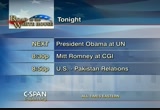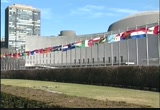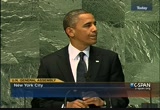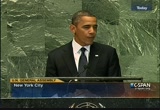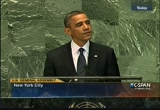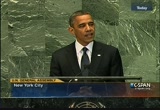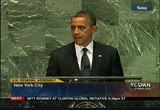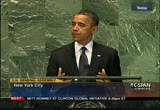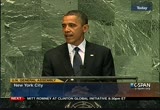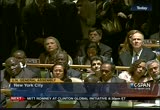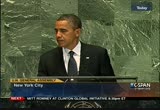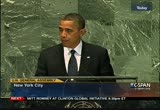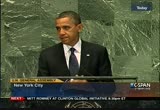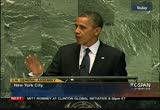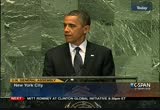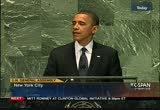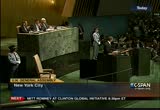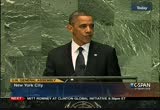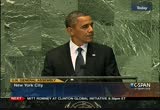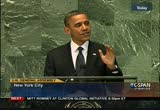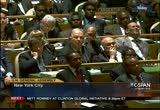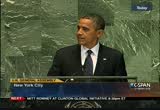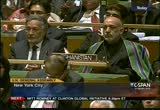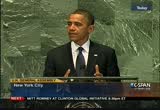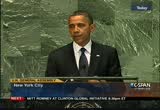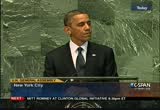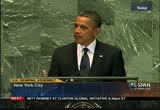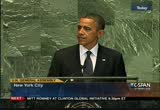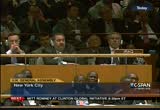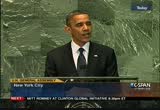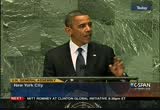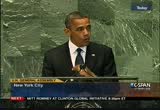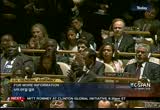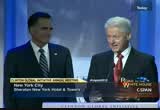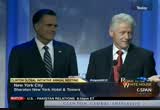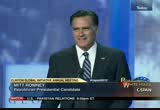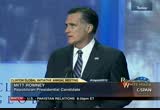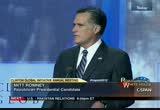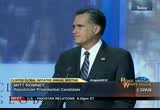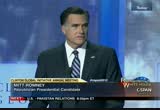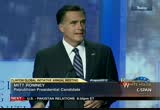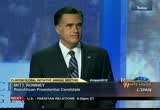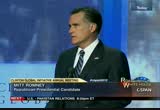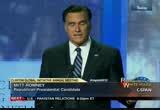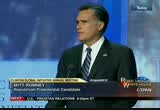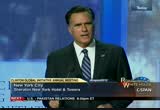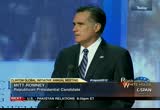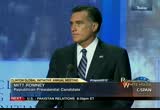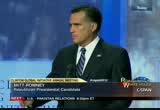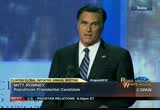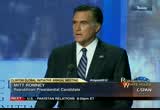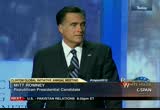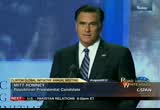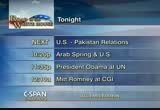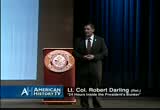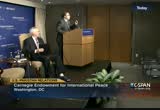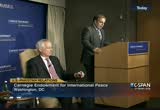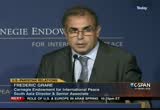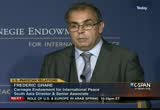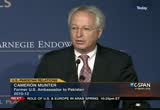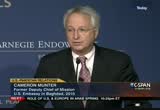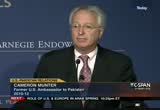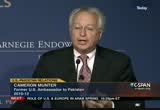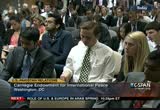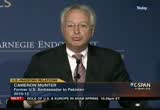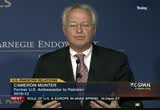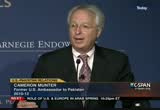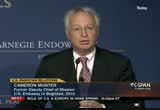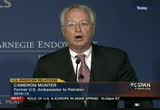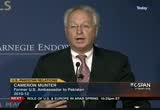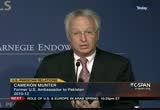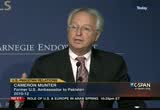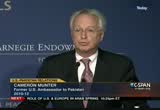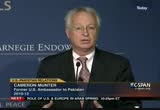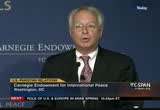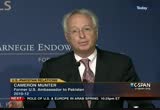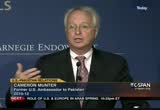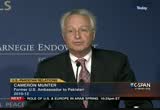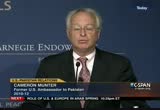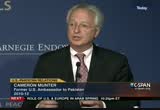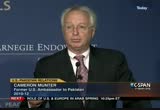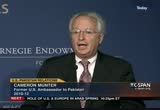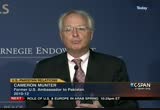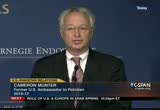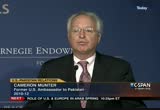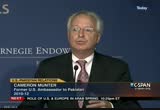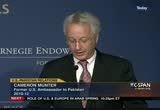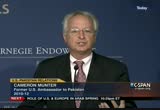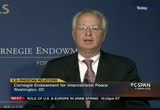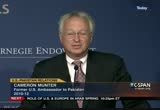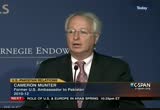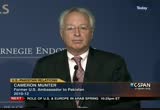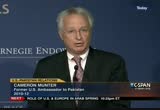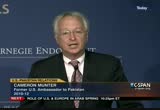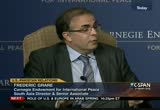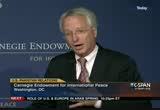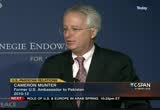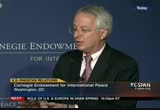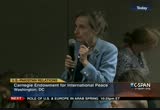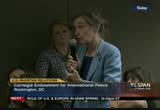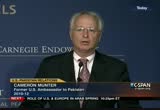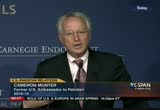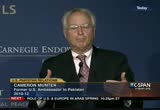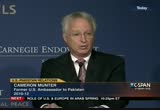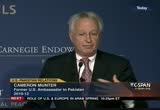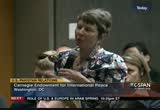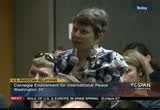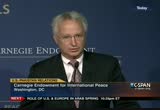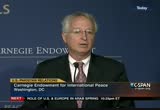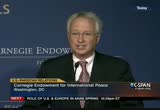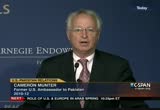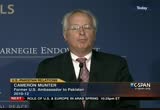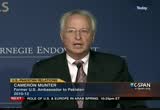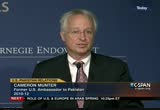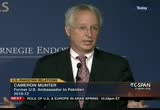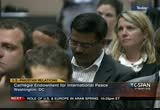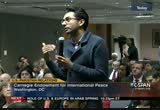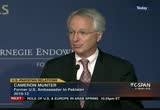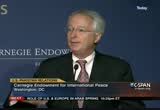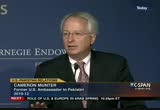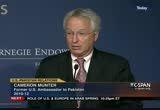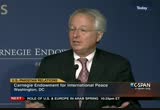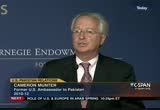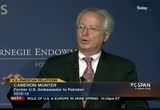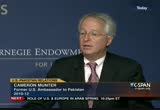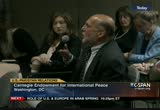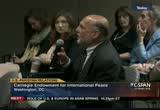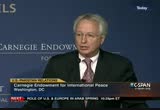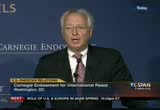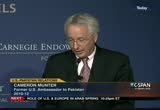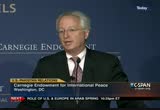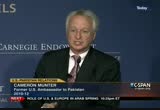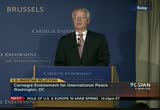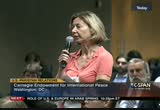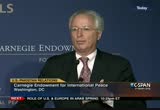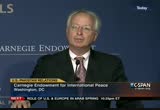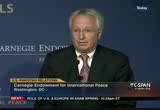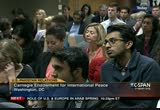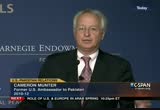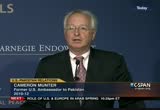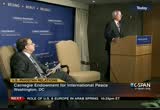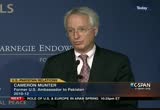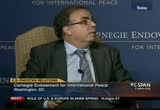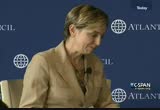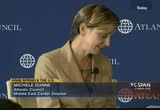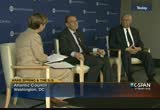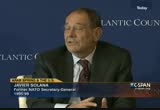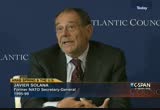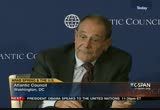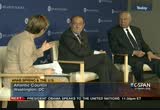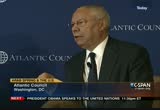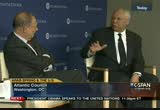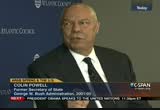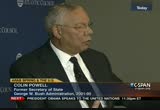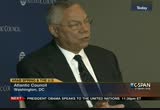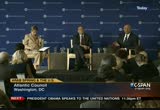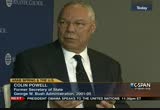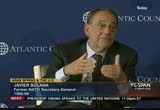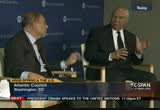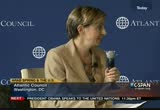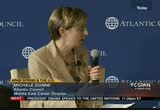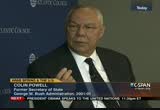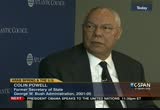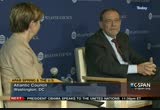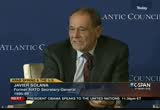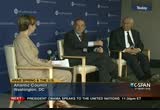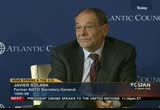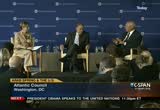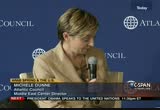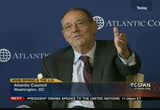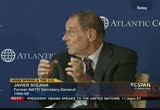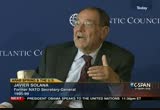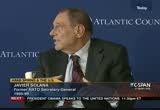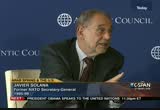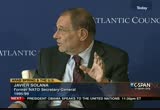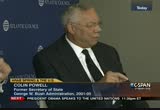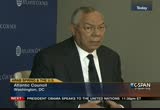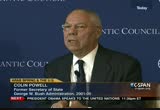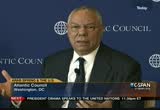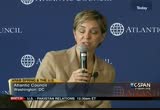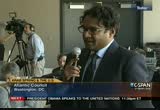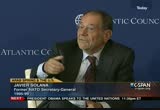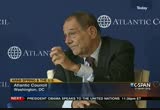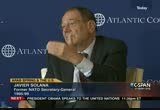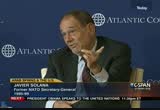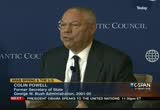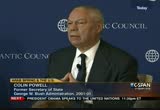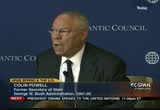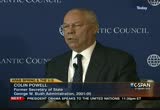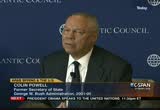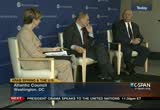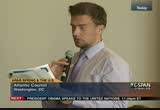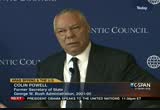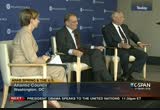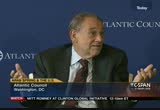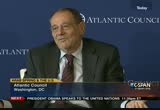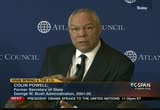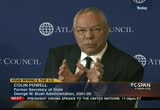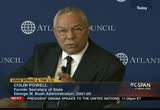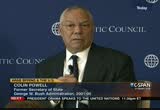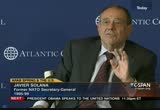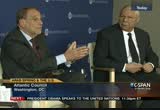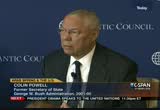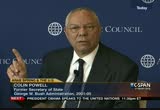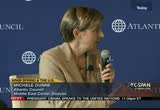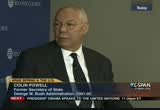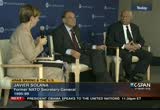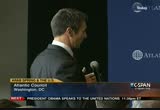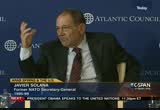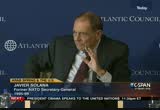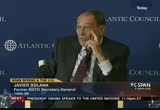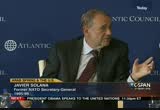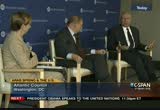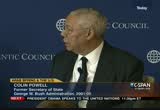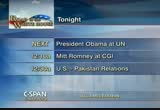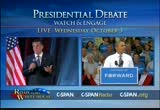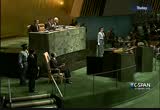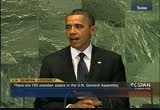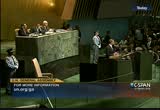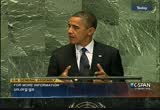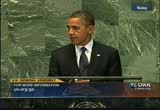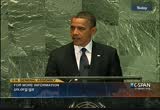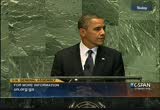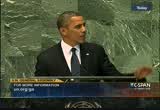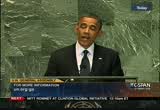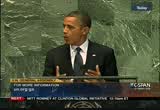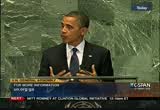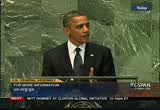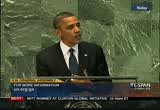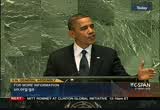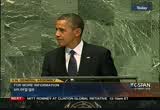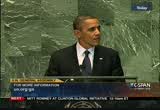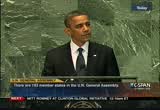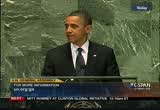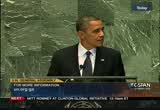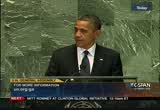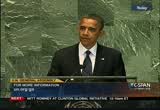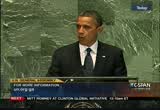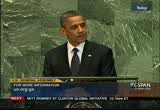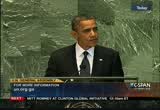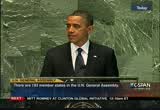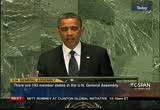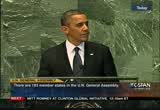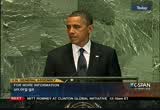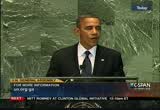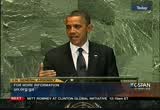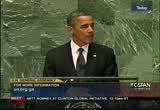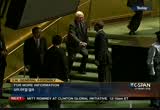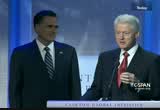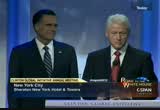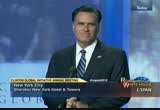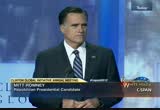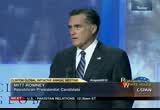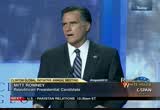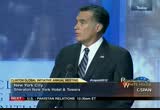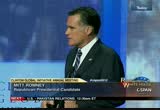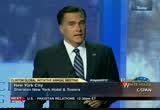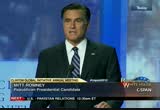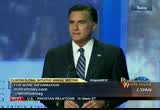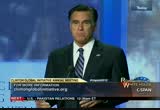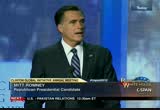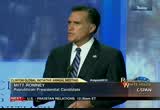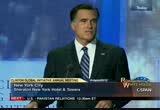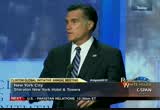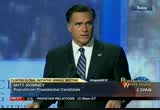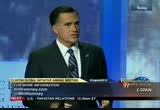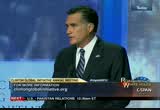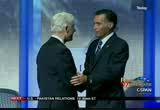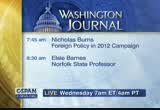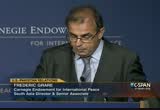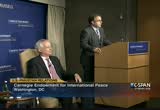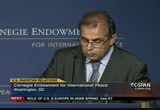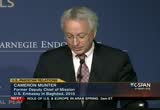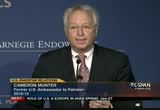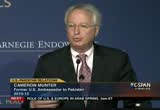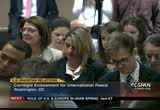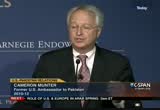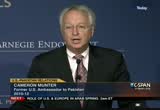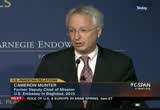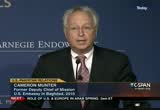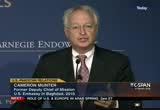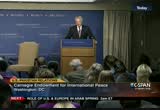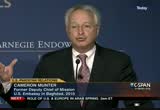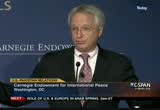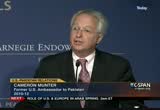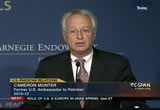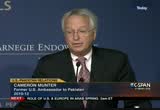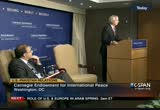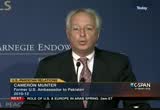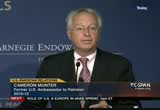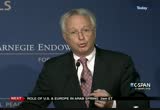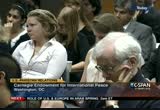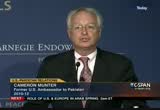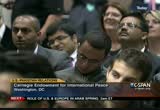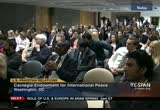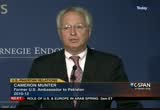tv Capitol Hill Hearings CSPAN September 25, 2012 8:00pm-1:00am EDT
8:00 pm
span, c-span radio, and online at. in a few moments, president obama's speech to the un general assembly. in half an hour, mitt romney is that the clinton global initiative. after that, a discussion of relations between the u.s. and pakistan. >> watched and engage with c- span, including our live debate preview starting at 7:00. post-debate, your reaction and comments. follow our live coverage on c- span, c-span radio, and c- span.org. >> president obama's speech to the u.n. general assembly include comment on the video that sparked protests in the muslim world, iran's nuclear
8:01 pm
8:02 pm
like to begin today by telling you about an american named chris stevens. chris was born in a town called grass valley, california, the son of a lawyer and a musician. as a young man, chris joined the peace corps, and taught english in morocco. and he came to love and respect the people of north africa and the middle east. he would carry that commitment throughout his life. as a diplomat, he worked from egypt to syria, from saudi arabia to libya. he was known for walking the streets of the cities where he worked -- tasting the local food, meeting as many people as he could, speaking arabic, listening with a broad smile. chris went to benghazi in the early days of the libyan revolution, arriving on a cargo ship. as america's representative, he
8:03 pm
helped the libyan people as they coped with violent conflict, cared for the wounded, and crafted a vision for the future in which the rights of all libyans would be respected. and after the revolution, he supported the birth of a new democracy, as libyans held elections, and built new institutions, and began to move forward after decades of dictatorship. chris stevens loved his work. he took pride in the country he served, and he saw dignity in the people that he met. and two weeks ago, he traveled to benghazi to review plans to establish a new cultural center and modernize a hospital. that's when america's compound came under attack. along with three of his colleagues, chris was killed in the city that he helped to save. he was 52 years old.
8:04 pm
i tell you this story because chris stevens embodied the best of america. like his fellow foreign service officers, he built bridges across oceans and cultures, and was deeply invested in the international cooperation that the united nations represents. he acted with humility, but he also stood up for a set of principles -- a belief that individuals should be free to determine their own destiny, and live with liberty, dignity, justice, and opportunity. the attacks on the civilians in benghazi were attacks on america. we are grateful for the assistance we received from the libyan government and from the libyan people. there should be no doubt that we will be relentless in tracking down the killers and bringing them to justice.
8:05 pm
and i also appreciate that in recent days, the leaders of other countries in the region -- including egypt, tunisia and yemen -- have taken steps to secure our diplomatic facilities, and called for calm. and so have religious authorities around the globe. but understand, the attacks of the last two weeks are not simply an assault on america. they are also an assault on the very ideals upon which the united nations was founded -- the notion that people can resolve their differences peacefully, that diplomacy can take the place of war, that in an interdependent world, all of us have a stake in working towards greater opportunity and security for our citizens.
8:06 pm
if we are serious about upholding these ideals, it will not be enough to put more guards in front of an embassy, or to put out statements of regret and wait for the outrage to pass. if we are serious about these ideals, we must speak honestly about the deeper causes of the crisis -- because we face a choice between the forces that would drive us apart and the hopes that we hold in common. today, we must reaffirm that our future will be determined by people like chris stevens -- and not by his killers. today, we must declare that this violence and intolerance has no place among our united nations. it has been less than two years since a vendor in tunisia set himself on fire to protest the oppressive corruption in his country, and sparked what became known as the arab spring. and since then, the world has been captivated by the
8:07 pm
transformation that's taken place, and the united states has supported the forces of change. we were inspired by the tunisian protests that toppled a dictator, because we recognized our own beliefs in the aspiration of men and women who took to the streets. we insisted on change in egypt, because our support for democracy ultimately put us on the side of the people. we supported a transition of leadership in yemen, because the interests of the people were no longer being served by a corrupt status quo. we intervened in libya alongside a broad coalition, and with the mandate of the united nations security council, because we had the ability to stop the slaughter of innocents, and because we believed that the aspirations of the people were more powerful than a tyrant. and as we meet here, we again
8:08 pm
declare that the regime of bashar al-assad must come to an end so that the suffering of the syrian people can stop and a new dawn can begin. we have taken these positions because we believe that freedom and self-determination are not unique to one culture. these are not simply american values or western values -- they are universal values. and even as there will be huge challenges to come with a transition to democracy, i am convinced that ultimately government of the people, by the people, and for the people is more likely to bring about the stability, prosperity, and individual opportunity that serve as a basis for peace in our world. so let us remember that this is a season of progress. for the first time in decades, tunisians, egyptians and libyans voted for new leaders in elections that were credible, competitive, and fair.
8:09 pm
this democratic spirit has not been restricted to the arab world. over the past year, we've seen peaceful transitions of power in malawi and senegal, and a new president in somalia. in burma, a president has freed political prisoners and opened a closed society, a courageous dissident has been elected to parliament, and people look forward to further reform. around the globe, people are making their voices heard, insisting on their innate dignity, and the right to determine their future. and yet the turmoil of recent weeks reminds us that the path to democracy does not end with the casting of a ballot. nelson mandela once said: "to be free is not merely to cast off one's chains, but to live in a way that respects and enhances the freedom of others."
8:10 pm
true democracy demands that citizens cannot be thrown in jail because of what they believe, and that businesses can be opened without paying a bribe. it depends on the freedom of citizens to speak their minds and assemble without fear, and on the rule of law and due process that guarantees the rights of all people. in other words, true democracy -- real freedom -- is hard work. those in power have to resist the temptation to crack down on dissidents. in hard economic times, countries must be tempted -- may be tempted to rally the people around perceived enemies, at home and abroad, rather than focusing on the painstaking work of reform. moreover, there will always be those that reject human progress -- dictators who cling to power, corrupt interests that depend on the status quo, and
8:11 pm
extremists who fan the flames of hate and division. from northern ireland to south asia, from africa to the americas, from the balkans to the pacific rim, we've witnessed convulsions that can accompany transitions to a new political order. at time, the conflicts arise along the fault lines of race or tribe. and often they arise from the difficulties of reconciling tradition and faith with the diversity and interdependence of the modern world. in every country, there are those who find different religious beliefs threatening; in every culture, those who love freedom for themselves must ask themselves how much they're willing to tolerate freedom for others. that is what we saw play out in the last two weeks, as a crude
8:12 pm
and disgusting videonow, i havet the united states government had nothing to do with this video, and i believe its message must be rejected by all who respect our common humanity. it is an insult not only to muslims, but to america as well -- for as the city outside these walls makes clear, we are a country that has welcomed people of every race and every faith. we are home to muslims who worship across our country. we not only respect the freedom of religion, we have laws that protect individuals from being harmed because of how they look or what they believe. we understand why people take offense to this video because millions of our citizens are among them. i know there are some who ask why we don't just ban such a video. and the answer is enshrined in
8:13 pm
our laws -- our constitution protects the right to practice free speech. here in the united states, countless publications provoke offense. like me, the majority of americans are christian, and yet we do not ban blasphemy against our most sacred beliefs. as president of our country and commander-in-chief of our military, i accept that people are going to call me awful things every day -- and i will always defend their right to do so. americans have fought and died around the globe to protect the right of all people to express their views, even views that we profoundly disagree with. we do not do so because we support hateful speech, but because our founders understood that without such protections,
8:14 pm
the capacity of each individual to express their own views and practice their own faith may be threatened. we do so because in a diverse society, efforts to restrict speech can quickly become a tool to silence critics and oppress minorities. we do so because given the power of faith in our lives, and the passion that religious differences can inflame, the strongest weapon against hateful speech is not repression; it is more speech -- the voices of tolerance that rally against bigotry and blasphemy, and lift up the values of understanding and mutual respect. now, i know that not all countries in this body share this particular understanding of the protection of free speech. we recognize that. but in 2012, at a time when
8:15 pm
anyone with a cell phone can spread offensive views around the world with the click of a button, the notion that we can control the flow of information is obsolete. the question, then, is how do we respond? and on this we must agree -- there is no speech that justifies mindless violence. there are no words that excuse the killing of innocents. there's no video that justifies an attack on an embassy. there's no slander that provides an excuse for people to burn a restaurant in lebanon, or destroy a school in tunis, or cause death and destruction in pakistan. in this modern world with modern technologies, for us to respond in that way to hateful speech empowers any individual who engages in such speech to create chaos around the world. we empower the worst of us if
8:16 pm
that's how we respond. more broadly, the events of the last two weeks also speak to the need for all of us to honestly address the tensions between the west and the arab world that is moving towards democracy. now, let me be clear. just as we cannot solve every problem in the world, the united states has not and will not seek to dictate the outcome of democratic transitions abroad. we do not expect other nations to agree with us on every issue, nor do we assume that the violence of the past weeks or the hateful speech by some individuals represent the views of the overwhelming majority of muslims, any more than the views of the people who produced this video represents those of
8:17 pm
americans. however, i do believe that it is the obligation of all leaders in all countries to speak out forcefully against violence and extremism. it is time to marginalize those who -- even when not directly resorting to violence -- use hatred of america, or the west, or israel, as the central organizing principle of politics. for that only gives cover, and sometimes makes an excuse, for those who do resort to violence. that brand of politics -- one that pits east against west, and south against north, muslims against christians and hindu and jews -- can't deliver on the promise of freedom. to the youth, it offers only false hope. burning an american flag does nothing to provide a child an education.
8:18 pm
smashing apart a restaurant does not fill an empty stomach. attacking an embassy won't create a single job. that brand of politics only makes it harder to achieve what we must do together -- educating our children, and creating the opportunities that they deserve; protecting human rights, and extending democracy's promise. understand america will never retreat from the world. we will bring justice to those who harm our citizens and our friends, and we will stand with our allies. we are willing to partner with countries around the world to deepen ties of trade and investment, and science and technology, energy and development -- all efforts that can spark economic growth for all our people and stabilize democratic change.
8:19 pm
but such efforts depend on a spirit of mutual interest and mutual respect. no government or company, no school or ngo will be confident working in a country where its people are endangered. for partnerships to be effective our citizens must be secure and our efforts must be welcomed. a politics based only on anger -- one based on dividing the world between "us" and "them" -- not only sets back international cooperation, it ultimately undermines those who tolerate it. all of us have an interest in standing up to these forces. let us remember that muslims have suffered the most at the hands of extremism. on the same day our civilians were killed in benghazi, a turkish police officer was murdered in istanbul only days before his wedding.
8:20 pm
more than 10 yemenis were killed in a car bomb in sana'a. several afghan children were mourned by their parents just days after they were killed by a suicide bomber in kabul. the impulse towards intolerance and violence may initially be focused on the west, but over time it cannot be contained. the same impulses toward extremism are used to justify war between sunni and shia, between tribes and clans. it leads not to strength and prosperity but to chaos. in less than two years, we have seen largely peaceful protests bring more change to muslim- majority countries than a decade of violence. and extremists understand this. because they have nothing to offer to improve the lives of people, violence is their only way to stay relevant. they don't build. they only destroy.
8:21 pm
it is time to leave the call of violence and the politics of division behind. on so many issues, we face a choice between the promise of the future, or the prisons of the past. and we cannot afford to get it wrong. we must seize this moment. and america stands ready to work with all who are willing to embrace a better future. the future must not belong to those who target coptic christians in egypt -- it must be claimed by those in tahrir square who chanted, "muslims, christians, we are one." the future must not belong to those who bully women -- it must be shaped by girls who go to school, and those who stand for a world where our daughters can live their dreams just like our sons. the future must not belong to those corrupt few who steal a
8:22 pm
country's resources -- it must be won by the students and entrepreneurs, the workers and business owners who seek a broader prosperity for all people. those are the women and men that america stands with, theirs is the vision we will support. the future must not belong to those who slander the prophet of islam. but to be credible, those who condemn that slander must also condemn the hate we see in the images of jesus christ that are desecrated, or churches that are destroyed, or the holocaust that is denied. let us condemn incitement against sufi muslims and shiite pilgrims. it's time to heed the words of gandhi -- "intolerance is itself a form of violence and an obstacle to the growth of a true democratic spirit."
8:23 pm
together, we must work towards a world where we are strengthened by our differences, and not defined by them. that is what america embodies, that's the vision we will support. among israelis and palestinians, the future must not belong to those who turn their backs on a prospect of peace. let us leave behind those who thrive on conflict, those who reject the right of israel to exist. the road is hard, but the destination is clear -- a secure, jewish state of israel and an independent, prosperous palestine. understanding that such a peace must come through a just agreement between the parties, america will walk alongside all who are prepared to make that journey. in syria, the future must not
8:24 pm
belong to a dictator who massacres his people. if there is a cause that cries out for protest in the world today, peaceful protest, it is a regime that tortures children and shoots rockets at apartment buildings. and we must remain engaged to assure that what began with citizens demanding their rights does not end in a cycle of sectarian violence. together, we must stand with those syrians who believe in a different vision -- a syria that is united and inclusive, where children don't need to fear their own government, and all syrians have a say in how they are governed -- sunnis and alawites, kurds and christians. for.s what america stands that is the outcome that we will work for -- with sanctions and consequences for those who persecute, and assistance and support for those who work for this common good. because we believe that the syrians who embrace this vision will have the strength and the
8:25 pm
legitimacy tlead. in iran, we see where the path of a violent and unaccountable ideology leads. the iranian people have a remarkable and ancient history, and many iranians wish to enjoy peace and prosperity alongside their neighbors. but just as it restricts the rights of its own people, the iranian government continues to prop up a dictator in damascus and supports terrorist groups abroad. time and again, it has failed to take the opportunity to demonstrate that its nuclear program is peaceful, and to meet its obligations to the united nations. so let me be clear. america wants to resolve this issue through diplomacy, and we believe that there is still time and space to do so. but that time is not unlimited. we respect the right of nations
8:26 pm
to access peaceful nuclear power, but one of the purposes of the united nations is to see that we harness that power for peace. and make no mistake, a nuclear- armed iran is not a challenge that can be contained. it would threaten the elimination of israel, the security of gulf nations, and the stability of the global economy. it risks triggering a nuclear- arms race in the region, and the unraveling of the non- proliferation treaty. that's why a coalition of countries is holding the iranian government accountable. and that's why the united states will do what we must to prevent iran from obtaining a nuclear weapon. we know from painful experience that the path to security and prosperity does not lie outside the boundaries of international law and respect for human rights. that's why this institution was established from the rubble of conflict. that is why liberty triumphed
8:27 pm
over tyranny in the cold war. and that is the lesson of the last two decades as well. history shows that peace and progress come to those who make the right choices. nations in every part of the world have traveled this difficult path. europe, the bloodiest battlefield of the 20th century, is united, free and at peace. from brazil to south africa, from turkey to south korea, from india to indonesia, people of different races, religions, and traditions have lifted millions out of poverty, while respecting the rights of their citizens and meeting their responsibilities as nations. and it is because of the progress that i've witnessed in my own lifetime, the progress that i've witnessed after nearly four years as president, that i remain ever hopeful about the world that we live in. the war in iraq is over. american troops have come home.
8:28 pm
we've begun a transition in afghanistan, and america and our allies will end our war on schedule in 2014. al qaeda has been weakened, and osama bin laden is no more. nations have come together to lock down nuclear materials, and america and russia are reducing our arsenals. we have seen hard choices made -- from naypyidaw to cairo to abidjan -- to put more power in the hands of citizens. at a time of economic challenge, the world has come together to broaden prosperity. through the g20, we have partnered with emerging countries to keep the world on the path of recovery. america has pursued a development agenda that fuels growth and breaks dependency, and worked with african leaders to help them feed their nations. new partnerships have been forged to combat corruption and promote government that is open
8:29 pm
and transparent, and new commitments have been made through the equal futures partnership to ensure that women and girls can fully participate in politics and pursue opportunity. and later today, i will discuss our efforts to combat the scourge of human trafficking. all these things give me hope. but what gives me the most hope is not the actions of us, not the actions of leaders -- it is the people that i've seen. the american troops who have risked their lives and sacrificed their limbs for strangers half a world away, the students in jakarta or seoul who are eager to use their knowledge to benefit mankind, the faces in a square in prague or a parliament in ghana who see democracy giving voice to their aspirations, the young people in the favelas of rio and the schools of mumbai whose eyes shine with promise. these men, women, and children of every race and every faith
8:30 pm
remind me that for every angry mob that gets shown on television, there are billions around the world who share similar hopes and dreams. they tell us that there is a common heartbeat to humanity. so much attention in our world turns to what divides us. that's what we see on the news. that's what consumes our political debates. but when you strip it all away, people everywhere long for the freedom to determine their destiny, the dignity that comes with work, the comfort that comes with faith, and the justice that exists when governments serve their people -- and not the other way around. the united states of america will always stand up for these aspirations, for our own people and for people all across the world. that was our founding purpose.
8:31 pm
that is what our history shows. that is what chris stevens worked for throughout his life. and i promise you this -- long after the killers are brought to justice, chris stevens's legacy will live on in the lives that he touched -- in the tens of thousands who marched against violence through the streets of benghazi, in the libyans who changed their facebook photo to one of chris, in the signs that read, simply, "chris stevens was a friend to all libyans." they should give us hope. they should remind us that so long as we work for it, justice will be done, that history is on our side, and that a rising tide of liberty will never be reversed. thank you very much. [applause]
8:32 pm
8:33 pm
congress, the model for me was a program based in boston called city year, which a lot of you know about. it is a great program. when i left the white house there was discussion about whether americorps would be defunded, the largest affiliate in the united states was city year, and mitt romney was on the board. i wrote him a letter saying we should continue this. i called him and i was out of the white house and i said, governor, i love city year. that is what americorps is all about.
8:34 pm
i hope you will save it. he urged the republican congress to continue to support city year, and they did. i just visited the program in south africa where the youth unemployment rate exceeds 40%, and 80% of the volunteers in johannesburg have a job the day they leave city year. it turns out it is good economics and good for the society. all of you should know that, and, governor, i thank you for being here. the podium is yours. [applause] >> thank you, mr. president. i appreciate your kind words, and that introduction is very touching.
8:35 pm
>> if there's one thing we've learned this election season, it's that a few words from bill clinton can do any man a lot of good. [laughter] after that introduction -- since serving as president here in america, president clinton has devoted himself to lifting the downtrodden around the world. one of the best things that can happen to any cause, to any people, is to have bill clinton as its advocate. i appreciate your willingness to come to us with those messages. as i have watched the astounding impact of this
8:36 pm
initiative from afar, i have been impressed by the extraordinary power you have derived by harnessing together different people of different backgrounds, and different institutions of different persuasions. you have fashioned partnerships across traditional boundaries -- public and private, for- profit and nonprofit, charitable and commercial. on a smaller scale, i have seen partnerships like this work before. in massachusetts, two social pioneers brought corporations and government and volunteers together to form city year, the model for americorps. i sat with then candidate for president bill clinton as he investigated the life-changing successes which occurred when young people came together for a year of service, linked in teams with corporate sponsors.
8:37 pm
then, as the head of the 2002 winter olympic games, i saw again the stunning success than comes when the disparate elements of a community join together in unity, to overcome challenges that had seemed insurmountable before. the initiative has demonstrated the effectiveness of entrepreneurship and social enterprise. we endeavor not only to comfort and assuage the pains of the afflicted, but also to change lives, and change the lives through freedom, free enterprise, through entrepreneurship, and the incomparable dignity associated with work. free enterprise has done more to bless humanity than any other system, not only because it is the only system that treats a
8:38 pm
prosperous middle class, but because it is the only system where the individual enjoys the freedom to guide and build his or her life. free enterprise cannot only make us better off financially, it can make us better people. ours is a compassionate nation, as you know. you look around the world and we see enduring suffering. our hearts break. we make up only 4.5% of the world's population. we donate nearly 1/4 of all foreign aid. americans give more of the money. pastors like rick warren lead mission trips that sends thousands of americans around the world to bring comfort. american troops, the first on the scene of a natural disaster. an earthquake strikes, in haiti, care packages come from all over the world, but first from
8:39 pm
america, not far behind our presidents clinton and bush. too often our passion for charity as a people is tempered by our sense that our aid is not always effective. we see stories and cases where american aid has been diverted to corrupt governments. we wonder why year after year after year of aid and relief seem to never extinguish the suffering. why does it persist decade after decade? some of the disappointments are due to our failure to recognize how much the developing world has changed. a lot of the foreign aid efforts we put in place years ago were decided at a time when government development assistance accounted for 75% of the resources flowing to developing nations. today 82% of the resources that flow to developing nations come from the private sector, not the governmental sector.
8:40 pm
if somehow foreign aid can leverage that massive investment by the private sector, it may be able to expand the ability to not only care for those suffering, but also to change their lives on a permanent basis. private enterprise is having a greater impact on its own in the developing world. an example, the john deere company developed a suite of farm tools that could be attached to a small tractor. the result has been a good investment for the company and a greater opportunity for african farmers who are able to grow more crops and provide for more plentiful lives of their own. for american foreign aid to become more effective, it has got to embrace the principles that you see in these global
8:41 pm
initiatives -- the power of partnerships, access to the transformative nature of free enterprise, and the leverage of the abundant resources that can come from the private sector. i believe there are three legitimate object of our foreign aid in this country. first is to address humanitarian needs. this is the case with petfar, which has given millions help. the second is to foster substantial united states' strategic interests, perhaps military, diplomatic, or economic. the third is one that has to receive more attention at a higher priority in the romney administration. that is something that elevates people and brings about lasting change in communities and nations. for example, a lot of americans, including myself, are troubled
8:42 pm
by developments in the middle east. syria has witnessed the killing of tens of thousands of people. the president of egypt is a member of the muslim brotherhood. our ambassador to libya was assassinated in a terrorist attack. iran is moving toward nuclear weapons capability. we somehow feel we are at the mercy of events rather than shaping events. i am asked why. what can we do about it, to lead in the middle east to stability and ease the suffering, anger, and hate, and the violence? religious extremism is part of the problem. that is not the whole story. the population of the middle east is very young, particularly in comparison to the population of the developed nations. typically these young people do not have a lot of job prospects, for the levels of youth unemployment across the region are excessive and chronic.
8:43 pm
the nations that have undergone a change in leadership recently, young people have greater access to information, and in the past that was being carefully guarded by tyrants and dictators. now it is available. they see that good as well as the bad in surrounding societies. they can now organized across mobilizing populations. accumulated by poverty and crushed by government frustration, their frustration and anger in such a setting, for americans to change lives, change communities and nations in the middle east, foreign aid must play a role, and the shape that role should play was brought under focus with the
8:44 pm
life and death of a man of tunisia, the vendor, who sparked the arab spring. he was just 26 years old. he provided for his family since he was a young boy. he worked his small fruit stand selling to passersby. the regular harassment by bureaucrats was elevated when they took cases of his fruit and then they took away his scales away from him again. on the day of his final protest, witnesses say an officer slapped him, and he cried out with these words, "why are you doing this to me? i am a simple person. i just want to work. i just want to work." work. that has to be at the heart of our effort to create jobs, young and old alike, and work builds self-esteem.
8:45 pm
it transforms minds from fantasy to reality and grounding. work does not long tolerate corruption, nor will it quietly endured a brazen theft by government of the product of hard-working men and women. to foster work and enterprise in the middle east and other developing countries, i will initiate something i call prosperity pacts, working with the private sector. it will identify the barriers to investment and trade and entrepreneurship in developing nations. in exchange, all the nations will receive u.s. assistance packages focused on developing the institutions of liberty, rule of law, and property rights. we will focus efforts on small- and medium-sized businesses. microfinance has been a tool in
8:46 pm
promoting enterprise, but we have to expand the small- and medium-sized business as well those too small for traditional banking. the aim of a much larger share of our aid must be the promotion of work and the fostering of free enterprise. nothing we can do as a nation will change lives and nations more effectively and permanently than sharing the insights that lies at the foundation of america's economy. that is that free people pursuing happiness in their own ways. i traveled to a number of countries and was struck by the vast difference of wealth in nations that were sometimes neighbors. some of that was due to geography. rich countries often have natural resources like mineral deposits or access to waterways for trade.
8:47 pm
in some cases, all that seemed to separate a rich country from a more poor one was a faint line on the map. in some cases they were economically worlds apart. you can think of north korea and south korea. i became convinced of the critical difference between these countries was not geographic. i noticed the most successful countries shared something in common. they were the freest. they protected the rights of individuals. they enforced rule law. they encouraged trade and enterprise. they understood economic freedom is the only force in history that has consistently lifted people out of poverty and kept people out of poverty. a temporary aid package can give an economy a boost. it can fund projects that can pay some bills, employs some people for a time, but it cannot sustain an economy for the long term.
8:48 pm
it cannot pull the whole weight because at some point the money runs out. but an assistance program that helps unleash free enterprise can create enduring prosperity. free enterprise is based on mutual exchange, millions of people buying, trading, building, investing. it has its ups and downs. it is not perfect. it is more reliable and more durable, and ultimately history has shown it is more successful. by the way, perhaps the best example of the good that free enterprise can do is by looking at the example of the developed world itself. my friend arthur at the american enterprise institute has pointed out before 1800 living standards in the west were appalling. a person born in the 18th century lived as his great- great-grandfather had.
8:49 pm
life was overwhelmed with disease and danger and early death. starting in 1800 the west began two centuries of free enterprise and trade. living standards rose, literacy spread. in our own country between 1820 and 1998, real per-capita gdp increased twenty-two-fold. as the most prosperous nation, it is our duty to keep the engine of prosperity running, to open markets across the globe and to spread prosperity. we should do it because it is the right moral course. it is also economically the smart thing for us to do. in our export industry, the typical job pays more than what jobs in comparable industries make. we have lost over 500,000 manufacturing jobs over the last four years.
8:50 pm
as president i will reverse that trend by ensuring we have trade that works for america. i want to negotiate new trade agreements and will ask congress to promote trade negotiating authority, to expand the transpacific partnership and what i call the reagan economic zone, where any nation who signs on can participate in a new community committed to free and fair trade. i have laid out a new approach for a new era. we will couple with trade and private investment and partnerships to empower individuals and courage innovators and reward entrepreneurs. we should not forget and cannot forget that not far from here a voice of unspeakable evil and hatred has spoken out, threatening israel and the entire civilized world.
8:51 pm
we come together knowing that the bitterness of hate is no match for the strength of love. in the weeks ahead, i will speak to these challenges and opportunities this moment presents us. i will go beyond foreign assistance and describe what i believe our strategy should be to secure our interests and ideals in this uncertain time. a year from now, i hope to return to this meeting as president, having made substantial progress toward achieving reforms i have outlined. i hope to remind the board of the goodness and the bigness of the american heart. i will never apologize for america. i believe america has been one of the greatest forces for good the world has ever known. we can hold knowledge in our hearts with humility. god bless you and this great work, and god bless my country and yours.
8:52 pm
thank you so very much. it has been an honor to be with you. [applause] [captioning performed by national captioning institute] [captions copyright national cable satellite corp. 2012] >> said the first of the presidential debates next wednesday live on c-span, c-span radio, and c-span.org. a discussion on relations between the u.s. and pakistan. the atlantic council will host a forum on the u.s. response to the arab spring. president obama speaks to the u.n. general assembly.
8:53 pm
on "washington journal" tomorrow morning, we will look at the issue of foreign policy on this year's presidential campaign. a political science professor at norfolk state university will focus on the role of virginia in the election. we will also be joined by the editor in chief of the washington monthly to discuss a recent article in the magazine examining the consumer financial protection juror -- protection bureau. >> september 11, 2001, was a day that changed my life forever. i will go through a presentation, able ally in the account of the historical account of the attack as things transpired that day. a lot of things happened very
8:54 pm
quickly. i will do my best not to ramble on and go too fast. i would ask you to sit back and clear your mind and put yourself in that room and you'll get a real sense of what it was like to be at the top of the food chain. >> more from a retired lieutenant colonel robert darling. this weekend on american history tv, sunday at 7:30 on c-span3. >> the former ambassador to pakistan says the u.s. needs a new approach in its relationship with that country. he spoke for the first time since returning from islam abide at an event hosted by the carnegie endowment for injured -- islamabad at an event hosted by the in the carnegie endowment for international peace. >> ladies and gentlemen, good morning and welcome to the
8:55 pm
stock. -- welcome to this talk. i am the new director. we do have the privilege to welcome this morning the ambassador. you havehat a long and distinguished career. he did serve in a number of positions in the national security council and the state department. your specialty ended in 2006 when he led the first reconstruction team in iraq. he then became ambassador before returning to the u.s. embassy in baghdad. in 2010, you were sworn in as
8:56 pm
u.s. ambassador to pakistan. i understand that after you retire, you'll be going to the columbia school of law and follow that with some other academic -- welcome back to the world of academia. you were the u.s. representative in pakistan during a challenging time. you helped mend relations between the two countries during a series of crisis in 2001, in particular. 2011 was indeed -- it was no small achievement. i suppose we all came to know
8:57 pm
what this crisis taught you about pakistan and the u.s. and about the relationship between the two countries. will the relations ever be the same? that is the question all lot of people have in mind. how is it likely to evolve? what are the challenges ahead? these are some of the questions and i guess there will be many more. i understand you intend to replace that in the larger context and the relation with pakistan since 2008. this is something we will welcome as well. ambassador, we are most honored to have you. we have -- we're very honored that you have chosen carnegie for your first place since returning from islamabad.
8:58 pm
[applause] >> it is great to see a number of france today. i thank you all for -- a number of friends today. i thank you all for coming here. i am retired, they cannot get me anymore. i can say what i want. having had enough of washington, i am getting out of town next week, so this is my opportunity before i am out the door to have a discussion with you, the people i respect most on this issue. i want to comment a little bit about my tenure in pakistan and the prospects for the future. i want to have a conversation with you, and i think we will have time for that. those of you who studied pakistan, you note the guiding principle is the principle of marriages. there are two narrative's.
8:59 pm
car narrative, their narratives. -- our narrative, their narrative. despite differences of ideologies, it is a remarkable consistency in the side of inheritance or prejudices' with which the two countries' approach each other. they focus heavily on bilateral relations as if there is nothing else other than the bilateral tie. there is a bit of obsessiveness that comes into the discussion and the literature about this. i will get to that towards the end. the pakistan notion that america uses pakistan and then leaves, there is a kind of back and forth positive relations,- relations pattern and this pattern which developed whether
9:00 pm
you want to look back to 1971, 1989, 2001, it is a very easy and comfortable pattern. there is a way by which america uses pakistan for its own needs and discards pakistan. having discovered this and repeated it to generations of young impressionable diplomats like myself, what has been known as a descriptive method becomes prescriptive. it is prescriptive that that is in the dna of the united states. it is the way america works. this is very crudely put. the pakistan the narrative. the american narrative is similar the crude, but similarly useful. we give these guys tons of money. every time, they betray a us.perat
9:01 pm
coming back to them times of need. we give them money, but are they grateful? no, they are spiteful. it is emotional on both sides. it is not just a question of analysis on the way countries work. the trailuestion of a the tra of people you want to love -- betrayel of people you want to love. there is this desire for more than just a relationship. not just a one-night stand, we want marriage. and the disappointment that comes with that. with those two narratives, it is my contention in 2008, with the end of dictatorship, there is an
9:02 pm
effort by people in both parties here in washington, but lead as , there isats came in and te this effort to say we will break out of this narrative, we will break out of this straitjacket of the up and down relationship and we will put our money where our mouth is. we measure the tool we use to show we are serious, money. that money was the legislation which promised $7.50 billion in civilian aid over five years at the beginning of the obama administration. if i understand it correctly, i was busy dodging other kinds of projectiles in iraq at the time. if i understand this correctly, this is a deeply idealistic
9:03 pm
effort to try to say, we are not only going to give money, not only have an impact with a fairly large, civilian assistance program to balance our ongoing military commitment to pakistan, but we are also going to set up a structure or relationship to what is generally called the strategic partnership to try to mbreak out of that pattern. after 2008 and 2009, those of you who knew richard knew the hurricane hit pakistan and there was a set of very ambitious goals that were put in to try to build a long-term commitment to pakistan. i use long-term advisedly. america is focused on the
9:04 pm
counter-terrorism after post- 9/11. by the almost a pistol logical elements -- epistemological element, this was to balance that short-term set of needs. american safety, the safety of the pack as any people. to balance that with a commitment of long-term stability, and a vision with pakistan of a long-term stability in pakistan. it seems naive now after we have gone through the ensuing years. i do believe that was done in good faith on the american side. there were many on the pakistan side who gambled it would work. whatever you think of their ability as statesmen and governance qualities, there was an element, a true attempt to try to forge a new relationship,
9:05 pm
h to teach a partnership -- a strategic partnership. it went over to this traditional part of our relationship, where i think the relationship, if you measure it by how many pieces they gave and how much they try to work together, there was a real effort to make that bloom after 2008. those of you who do not know the details -- those of you who do know the details now i am skipping over some to give direction. i believe that effort has failed. one of the reasons for the failure of that effort on the was then sside inability of the pakistan state to be the vehicle of the assistance. it was not strong enough for
9:06 pm
able enough to do with the americans hoped it could do. those of you who follow the assistance program know there was an attempt to have 50% of the money work through uphel government to government programs. if you are working in education, the goal was not just to build a dam, not just to build a school, but to improve the capacity, to build the capacity, of the prevention of -- potential government. when you talk to most pakistan you say, you give it to who? but it is worth it. we work not only notgo's, but with the government of pakistan.
9:07 pm
i would argue it is a failure. not a total failure. i think they got some results and continued to. it was a failure in the vision that we would build the kind of partnership with pakistan, with a capable pakistan that we wanted. those of you who read the book, and those of you who have not should not be in this room, will understand and buy that premise, as i do, that with a very weak straight and a strong society, the problem with putting all of that commitment into that week straighate is flawed. if there are not so many beggars in pakistan, but because of social, tribal, and local
9:08 pm
structures, it is worth paying attention to the fact that that is the way pakistan is governed and investing in the prospects for a strong state with a state in that situation is fraught with risk. that risk happened. that is one flaw in what happened after 2008. it is as if we drove a train over a truffle,, the pakistan government. it was too weak. i cannot tell you how many do the -- beautiful studies we have given to pakistan about energy that have been put to the shelf. it has not been able to respond. that is the pakistan failure. it is the u.s. failure, our inability to look after.
9:09 pm
the tendency to see the problems of counter-terrorism as an element of the relationship, or as i would put it, when you look at pakistan through the telescope of afghanistan, you see only one thing. if you insist on policy discussions in washington on the counter terrorism issue, focused on the immediate needs, very real and important needs, life and death needs, of the american effort in afghanistan, you run the risk of losing track of those -- term goals and that people like richard and hillary clinton, etc., articulated back in 2008. the american problem was that we were unable, i believe, to sort out in an effective way.
9:10 pm
when richard asked me to take this job, he made it quite clear -- note -- those of you who know him, he is humble. he created a system where he was , and all of the planets go around him. went out.ub wenn the power of his personality was something we really needed. especially because bureaucratically we created not just the usual state department geographical pierre a system. we created the solar system. when the light went out, we were
9:11 pm
rocks spinning around in the dark in space. that makes us sound more pathetic than i like to think we were. but it was very difficult. at that time, we struggled to try to figure out how it could work. a fabulous job was done of focusing that effort on the afghan peace. what happened at that point was the at this -- the oedipus that was built became much more difficult. the events omight have made it o the cold anyway to extend this balance of long-term and short-
9:12 pm
term efforts that we sought to build in 2008. we can look at 2011 and go through a few of those items, those events, and see where that imbalance came. one event at the beginning of 2011, and assassination, and the inability of the pakistan government to rally against the people, against the forces of intolerance, through the mainstream open-minded elements in pakistan, which i believe are many. you look at the books and the flames on the front and the titles are always about chaos and on the brink. i think while the author is correct, he tends to make things look much more dire than they actually are.
9:13 pm
pakistan is not -- but there is that perception that that is the case. partially, i would argue the perception is that way because at the times like the assassination, it was incumbent on the leadership of pakistan to make strong statements and they did not. they calculated that they were not strong enough to do that. if that is the case, that is more disturbing. then came the case in which a cia contractor was set upon by street thugs. i got a crash course in sharia law and spend the next several weeks trying to spent -- get him out of jail. this book showed a certain sense of, wait a minute, we have opened up to you and all of our worst fears about america doing things behind our back have been
9:14 pm
realized. it was a psychological moment. both for those people who opposed us in pakistan. i still had people to the end of the time that people were telling me. worse was the impasse to the people who were committed to us, those people who believed and said at the dinner parties, but whatever meeting, no, the americans mean it to this time. after 2008, there is a commitment. we can get away from the deficit. this hurt those people who had committed most to us in the sense that, what is going on here? here is this guy who was a arrested with illegal weapons. what was he doing? this hurt the trust.
9:15 pm
we just uncovered -- recovered from that when we have the osama bin laden raid. i am convinced, as most people will look at the evidence are convinced, that the top leadership, military, intelligence, and civilians, did not know osama bin laden was in abbottabad. all of us were exhausted from staying up a whole night. it was a punch drunk meeting. the first thing they said was congratulations. they realize someone who they were against and wanted to see gone was gone. it was only a few days after that that they realize that the political price the military was paying that that became manifest, when public american commentators said you are either implicit or incompetent, it happen to be true.
9:16 pm
it put them very much on the spot. the response by those pakistanis who had committed to working with us, who had --mitted to the post in the summer of 200011, when the general decided to ask us to take away the 150 trainers, who were trading the pakistan military in insurgency operations, i personally went to the general and said, are you aware that under american law, when you ask these people to leave, and i know you are doing this because you want to show
9:17 pm
you are not in the american pocket, we have to take with us the material, the actual assistance, the night vision goggles, computers, everything. if you get rid of the boys, you get rid of the toys. he looked me in the eye and said, i know. > i said, are you aware that in the fight you lost more soldiers in the last two years, that you are making it more likely your soldiers will die. he said, yes. that was just the political trade of he had to make. those people, and i would argue he was one, who had, after two dozen it, looked cautiously but tried to go along with this new picture with the ones who had to load up and send all the
9:18 pm
equipment home, along with the soldiers. that was made even deeper by the comments that took place in september. the real clincher was the incident of november in which 24 pakistani soldiers were killed. that was an accident. was not something done on purpose. as a result of the accretion of these events that had taken place that undercut the trust that those people who are most inclined to want to work with us felt, we did have a senior member is telling us, you obviously did this on purpose to teach us a lesson.
9:19 pm
you do not come in with a gun ship, and i do not know if you are military people, but the gunship fires not bullets but projectiles, so when you are hit, there is nothing left of you. when the pakistanis said in november of 2011 that this was something that was over the top, it was too much, what they were saying was you do not do something and say it was an accident. it was an accident. a terrible accident. we got to the point at the end of 2011 where those attempts to try to build the trust and build the relationship had basically
9:20 pm
come to the bottom. throughout my time in 2011, i kept thinking, when do we hit bottom? i realized this idea of hitting bottom like a submarine was a wrong metaphor. it was like rolling down the side of the ravine. you hit the rocks and you just keep going per. that is what to the sullivan was paris someone like me who prides himself as a foreign service officer and having worked on planning, i got a lesson on looking to the next day. that is the way to a dozen 11 was. it was that day for the pakistanis. we hit that point that everyone acknowledged in early 2012 where there was a timeout. it is an interesting problem because this goes away from the
9:21 pm
bilateral relationship because in pakistan, there was an effort to say, what else can we do? how can we access to assess this? this? there were other kinds of elements in the pakistan government to think, what do we do now that we have seen the americans do not seem to be able to do what we want them to do? we were saying, you are kicking out the people who are there to help you in this fight. whether or not you meant to, you had been lying in your country for five years. -- you had bin laden in your country for five years. there was a bit of a timeout. there was the unfortunate
9:22 pm
decision by the pakistan government to try to advocate from its strong position of, consistent position of being pro-american to focus on the parliament. the parliament did not cover itself. it took a long time to try to assess how it would look at the bilateral relationship. this underscored just how much the rhetoric of our relationship has been tied into pakistan a- american to the exclusion of everything else. thanks to the billions of people on both sides, and there is an eclectic scribes this problem -- article that describes this problem, thanks to that, we got some breathing room, that it was
9:23 pm
possible to begin to assess. at this point, the efforts that try to answer the question that was, can the relationship get ever back to the way it were, i would argue that is the wrong question. the attempt to have a strategic partnership as it was conceived in 2008, 2009, 2010, was not the right way to go about this. whether or not we meant to, we looked within the confines of the two narrative's to try to define how we were going to fix things in 2008. what we were trying to do is say here is the narrative. how are we going to try to
9:24 pm
change it? i would like to argue there is not a way to change this narrative. if anything, the narratives on both sides have become strengthened. it is hard for me to a match and anyone -- to imagine anyone can get a vote. it is hard for me to imagine anyone can get a vote in pakistan for being nice to the americans. as i wrap or relationship, the bilateral focus is not the way to go. there is the opportunity with the situation we have gotten into to look at many of the questions that say the strategic partnership looked at in a different context. those contexts are mainly regional contexts. if two dozen 11 was a lousy year for me, and it was, it was not such a lousy year for india- pakistan relations.
9:25 pm
it was not such a year for various elements of the economy. we go back and focus on the elements of pakistan. here they are not necessarily the element of the state who use our partners after 2008. the most dynamic partners as americans can have are the media people, some of the people in universities, the women's groups. i am not trying to talk about the the sense that those of us who work in the revolutions of 1989 looked to civil society. it is more complex and varied and difficult than the notions would have it. this is the part of pakistan where if you talk to pakistan is who are furious with the
9:26 pm
united states, any talk to them about what they want from the united states, they say, we want the hope and opportunity and we want that kind of social linke e have always felt with the united states. it would be wise for us to think about helping those parts of society to build ties with the united states, depending if we .an, not that if we a to put a lot more of our concentration into society where the face of america is not tthee of your neighbor, the engineer who works on a ditch, the face of a student, the face of your child that has come to america, etc. it would be a shift on our focus on who pakistan is.
9:27 pm
i am not sure that will be possible in the next two years. that is my second point. one is to you deal with in pakistan. but also when you deal with it. i think it is right for us to make sure we focus even though i was critical about the question of dominance of karen -- counter-terrorism that we had with afghanistan. we have to deal with al qaeda. we have to do with international terrorism. until 2014, it is unlikely in my mind that we can have a major change. that does not mean we cannot do our hallmark. it does not mean we cannot get, for example, the dynamic, philanthropic sector of pakistan to work with the thorough dynamic sector in the united states, which, in recent years, has not happened very much. we can reassert the ties between our institutions.
9:28 pm
the agricultural university and the university of california probably no between them more than any of us. after 2014, where there is a new kind of american focus on the region, and i would like to think if all goes as well as i hope it will, it will be somewhat more focused on maintaining the peace in pakistan and investing in pakistan's long-term future and society a little bit more than in its politics. similarly to , to expect pakistan will be altered is not realistic. i do not think we can apply it we can make pakistan into
9:29 pm
switzerland and a few years as by fixing them up. i do not think that will happen. nor would it be right for us to think that is a worthy goal. we should see if we can do what we can to help the efforts to internationalize pakistan. pakistan has an attraction for this bilateral narrative and focus. sadly, when you talk to pakistanis and they talk about seeing the tail lights of south korea, turkey, and bangladesh, seeing them ahead of them. koreans sent teams to pakistan 's find out what pakistan had done right. chinese introduced them to one of these professors, actually a
9:30 pm
businessman, who had come in 1979 or something. he said, i came here in the 70's and he wants to be like pakistan. that relative deterioration of the system, i would argue it nnerled to inter lookingness. help pakistan retouch to neighbors. it is crucial to see whether there is common ground between the united states and china. and there may be in pakistan. the chinese ambassador, when he would talk to me about their priorities, it sounded pretty close to ours. investment and keeping a lid on islamic fundamentalism. that sounds like a set of goals.
9:31 pm
can we work with other people. this is not just a question of what americans will do. it is a question of if pakistan itself will be able to reach out. one of the greatest things that has happened in the last few years is that, unless i read them incorrectly, the leadership of the military has blessed the opening to india. those of you who have much more experience in pakistan and thani know that was not the case a few years ago. in india, there was skepticism whether or not the pakistan military supports this opening. i believe it to be the case. the point is that the traditional means of looking at this country in a bilateral midway, the traditional means of trying to balance counter- terrorism and long-term
9:32 pm
stability, need to be broadened, and redefined. i am not clear how to say it, but we have the opportunity as we focus on tgetting things rigt in afghanistan and breaking the back of al qaeda and minimizing the threat to the united states, but then in the long-term, after 2014, where we look at a region, and it was said in a brilliant piece last november in a magazine, look at these two countries 10 years from now. afghanistan or a country with nuclear weapons? we will be able to conceive with our policy toward pakistan in a way that is broader, with more of a long-term focus, and is not trapped by the narrative's i started out with. we do not change the status. can we go around them?
9:33 pm
can we do something else the question of whether or not pakistanis are all be trayers. that is where the analogy for the people who have worked in europe have seen at the end of the cold war has some currency. it can be done. thought werehougwe never possible, like poles liking germans, can happen. it is a question of experience. we all take the long view, right? it will take patience and that will be hard to sell to the political party in the united states. , and giving you this litany of horrors, i have a level of optimism.
9:34 pm
i would emphasize not taking the relationship and sank, how do we fix it, but going around it and addressing the questions of energy and water in a much lateral way.ti- that is my take on where i think we can go. i would like to take the rest of the time to have a discussion. thank you. [applause] if i can just stand here, it is fine with me. >> your presentation about pakistan, it is quite unusual these days. we thought about going to pakistan to turn it into the next is on. i knew both countries very well.
9:35 pm
before we turn to the q and a, you mentioned 2008, the captivity of the pakistan states. [indiscernible] the partnership meant some trust. it was always on the line, but never really defined. do you say, looking back, that both existed at the time? >> yes, i do. i think it still exists. people who have -- people who claim we have come to a parting of ways and, why do you not just admit pakistan is bad and we are good? that is intellectual laziness. people are frustrated. understandably frustrated. i understand about frustration.
9:36 pm
if you are frustrated to walk away, i would make the same statement about the people who were saying, a fastener stevens was killed, so let's walk away from libya. i cannot think that is dispensable. you have to say, which elements of pakistan are progressive that do have common interests with us? if we are to look forward to pakistan opening up, and looking forward to pakistan with an energy that is self-sufficient, and an open economy which is less susceptible to extremism in the country, i think we have to do a better job and i think many of the people in this loam have a subtle understanding and to know this, we have to do a better job who are we working with? given these fraught relations of different institutions in the country, who do we choose to
9:37 pm
work with in which way and how can we modestly work ahead on different kinds of problems? when we say, we will create a strategic partnership in 12 areas, here is agriculture, here is water, and we will do it bilaterally and we will use a one-size-fits-all institutional link, by its very nature, some of these problems are not given to that kind of structure. we would have to say, where do we have to work? where do we have to work with the kind of strange group of people who are brought into what is trying to be billed for the future of afghanistan? what do we do about saudi arabia and the turks and these countries that have interests, some of them good and some of them not so benign, to assess
9:38 pm
them in a little more sophisticated way than in the past? it will not be at the back of a bumper sticker. it is the only way we can and gradually address these issues. >> introduce yourself before you ask your question. >> thank you for being here. i profoundly agree with your basic prescription, which i would take to be developing the relationship with pakistan for its own sake in those areas where there are people in institutions whose interests aligned well with hours and a little less dependence on the government. but i would like to push back a little bit against your notion that our problem is too much enough towas somism and not
9:39 pm
ism.rnational what we are all on up on now is not just counter-terrorism. it is afghanistan. what you are suggesting is we need to develop a relationship with pakistan that is not derivative of pacafghanistan. i totally agree. i think we will have trouble dealing with the afghan factor because there, i think our interests actually do not align all that well. having said i agree with your main point, what would you suggest as the kind of approach the united states can take to the afghan problem in order to minimize our dependence on the government of pakistan that only very selectively agrees? >> i am critical of bilateral
9:40 pm
ism. you are right. i am trying to do this for the illustration of the broader than just developmental idea. that there is a world with just america and pakistan and no one else in it. it is unfair of me to say -- of course smart people have looked outside of that. i am arguing against, this is how we define it. it is a huge problem and it is foremost in most people's mines. into doesn't 10, a general gave to president obama the paper which outlined, in his mind, the way ahead in afghanistan. we responded in a conference in february of 2012.
9:41 pm
the request and gave back our assessment. -- hillary clinton ge back our assessment. there is a great deal of space between our assessments. one of them is not just a question of pakistan and americans not seeing eye to eye with afghanistan. it is our way of talking about it. the picture we draw of pakistan is when they say, what is your end game? we talk about a strong central government in afghanistan. we talk about education, an army, 200 to 300,000 people -- 200,000 to 300,000 people. we have experts say, who will win? who are you picking? the way we look at it is not
9:42 pm
positive vista social science. .t is geographical, historical this person hated that person's grandfather. the rival visions of the military. the senior general in the military told me, you americans think of your army and helped sargent and solace in los - we see this part ofone solac --e world, in your attempt t
9:43 pm
you are missing the point. the transformational effort. little girls go to school. spending a few amount to a huge amount of money. i would argue the pakistanis have a static notion. they have been this way for 1000 years. they beat the brits and the russians. they beat -- they will beat you. i am agreeing with you in coming to some sort of closure in what afghanistan is. it is not that we think of the problem in the same way and disagreed. we think about the problem differently. we have not found a common language with which to talk
9:44 pm
about the endeand came in afghanistan. how will we come down to the tactical questions, etc., that we want to have with the afghans and pakistan's in talks? i agree with you it is a big problem. i do not know it is impossible for us to come to a set of and agreements with pakistan about afghanistan. the question i think we are struggling with is what is the mechanism in a bilateral relationship to try to pull people together to define those things we have in common with afghanistan? i think they are working on it right now. even in the last month, there have been developments i am not
9:45 pm
privy to but i sense are moving ahead. your question is a good one. we do not have, we have not achieved the kinds of meeting of minds on afghanistan we will need for this product before process.ces >> thank you. i am an independent consultant. i have a couple of questions that pick up on other points i believe you made. you are really suggesting we reset our relations with pakistan based on people who share our values. i am sympathetic to that idea. i want to first make a comment, which is that many of those
9:46 pm
people who, in some sense, identify with our values, our deceive at thisst ou point. -- feel deceived at this point. that is my first observation. my second observation is that, when you're talking about afghanistan and the notion of gradual social progress with the assistance of the international community, we are still, when we are talking about sending little girls to school, talking about a set of values that are not local. coming back to pakistan with those two thoughts in mind, how , allowing for the fact there is
9:47 pm
a large role for non-government relations, how do we -- not just that our something where do we start an official level once we get past the anniversary, etc.? how do we reset the official relationship and what do we do about the u.s. concern concerning nuclear weapons? >> that is a lot of questions. we will start with what i think is your main question. it is very important, i think, to talk about pakistan society and not t.
9:48 pm
if we look at the people, call them like minded people, and we are very surprised -- precise about that, those people who are n the western-oriented ngo's, it is a very small group of people. when i speak of reaching out to society, and this does not get to your question of exactly how we deal with the government, but i will try to get back to that, we have to accept a progressive vision of pakistan is not a in the sive vision o remade, european-style pakistan. in a general sense, i would argue a very broad group of people in pakistan, to varying degrees, is tolerant, open, and certainly religious.
9:49 pm
but i do not think dogmatically religious. there are elements of society, digging deeper than just the ,tmosphere of the western ngo's and we have not reached out to the people as much as we should. it is very hard because it is very dangerous. a lot of people are not diplomats, but university professors. it is predicated on the idea that we come out of these years of a terrorist threat successfully. we have to keep up the fight against terrorism and against, and come to an equitable solution in afghanistan. when we talk about building a progressive pakistan, this is a long -- it is not just on by
9:50 pm
diplomats. the people who feel besieged, we need to work with them. i think we want to look at the people who are our friends there who are affecting change in the country as a much broader area. what we tried to do was, in our public diplomacy, it is not enough to send out a press release in english. there are 50 million people in that country who are not very politicized. there are great differences in the country and we have no where near the amount of outreach to find a sympathy and areas of common ground that we could. i would argue that we have to read conceive of our allies and the people who are progressive.
9:51 pm
we have to see them differently. those universal bally -- values, we will have tough decisions. let's take education and pakistan. if we are going to have, as we would like to see, curriculum reform in pakistan that does not portray india negatively, that is going to be a long-term process. it will not be something we can deal with quickly. we will have to take incremental progress to try to fix that. it will have to happen there. these are long, hard things. you are right we have to keep as our goal universal values and we have to keep as our goal to support the westernized ngo's who are working in these countries, but we must go far beyond that. i hope i address your question.
9:52 pm
i am not sure what your question was about nuclear weapons. >> if i could clarify, the other mostf the spectrum is what u.s. policy makers believe to be our ultimate, no way to get rid of this problem with pakistan, which is its nuclear. starting at the humanist and is great. but they have not gone away. what does the dotted line look like from -- gays and on the soft side from -- deal with the hard side? >> my predecessors were there. we can illustrate what people would write.
9:53 pm
choose your verb. the disasters. the crashing. there are many elements of the relationship, government-to- government, institution-to- invitation, that remain quite strong. throughout these last couple of years, we have had very close ties to the isi. we have not achieved the things we would like to. we have very close ties. here i am heartbroken about the trainers leading, but we have been very close air force-to-air force. do not let my broad categories obscure the fact that there are many things we deal with very well. one of those is safety.
9:54 pm
we are all lease and gazed with alwaysistan -- engaged with the pakistanis about that. i would argue we have worked responsibly behind the headlines to try to make sure, do our best, that there will not be irresponsible protection of nuclear weapons and that the chances for an accident or an attack are minimized. i guess i would disagree that we are not doing that. what i am saying is, from that basis, the basis of our isi contacts, our military contacts, that the broader context of the relationship definitely needs to expand, both regionally and socially. that is in addition. >> the end of the room.
9:55 pm
>> i am from india. i would like to follow up on your remarks that the pakistan leadership [indiscernible] can you give us more insight? what are the reason they are doing so? is it just to buy some time? or are they sincere? >> i cannot judge their motives. i cannot judge whether they are sincere. they have told me, they have said it public that it is important to do this specifically, focusing on those items of confidence-building measures. you remember hearing what the general was saying after the tragedy on the glacier. what both of them had said to the business community.
9:56 pm
i can think of an example where they are saying, it is in our country's interest to open up to india. your guess is as good as mine. if they are doing this as a tactic, you have to ask them. the fact is, they are doing it. >> good morning. thank you for the wonderful talk. i am in agreement with a lot of what you said. i want to shift focus to your time in pakistan and talk more about how you see the domestic politics with elections coming up in the united states impacting this relationship you speak about. you speak about working with , buildingieties institutions.
9:57 pm
i think that is a positive move. it is a two-part question. >> in trying to make the argument that we should look beyond where we looked before, we do not want to stop working with the people in party politics. when people have asked me the question, and is used to happen quite a bit, how do you see pakistan in the arab spring, it is quite obvious that whatever you think of democracy, it is a democracy in pakistan. it is a system in which ways of social unrest and angkor can be channeled, whether it is through the outrageous media, through the courts inefficient as they
9:58 pm
are, especially at the local level. one of the things we should celebrate is that there is this imperfect democracy that is definitely worth working with. despite the claims that the board will be swept, i do not think that will happen. i am just getting my take -- giving my take on what will happen in the elections. he has done more than just rallies in sports stadiums, where you see the girls in blue jeans, alliance and a lance sitting down together. you have these items. he has also sent these people out. people went out to some village and they sat down on a bench in a village. people came to them and all the
9:59 pm
people did was to come in and talk about what is wrong. the national sport of pakistan. let me tell you what is wrong with pakistan. the representatives simply listened and after it was done, some pollsters came in and said, they are smart. i give that illustration to say i am a little more impressed with the organization than other people are. i think he will get his 40 seats, not his two seats. i think that is possible. if that vote, mixed with the strange system of local politics that exists in pakistan, my prediction would be that instead of two parties dominating, what you may end up
10:00 pm
with is something that you might recognize from germany or even israel, where you have a number of parties, no. -- none of which is a truly dominant party, many of which have to work with each other. this could lead with the -- to the kind of stability you have in those countries where you form coalitions based on many partners. more you have many partners, the more difficult it becomes to affect reform. especially in psych tax reform and energy reform. -- especially things like tax reform and energy reform. my guess is what we will see is a stable outcome in 2013 were
10:01 pm
the prospects for reform are less than they are now. that is not a pretty picture. it means you have more people in the tent so people feel the voices are being heard. people have argued are there such things as constituent in pakistani politics. but people are being represented. does this mean we can look homeward after 2013 to a government that can tackle the big issues? i am not terribly optimistic. that would be by america, if america and other like-minded countries, want to see change, it is the opposite of what the dalai lama tells you. change comes from without. the most potentially positive thing that could happen that
10:02 pm
would change the structure of things in pakistan in a good way would be opening up to india. indian capital. having opportunities for pakistani laborer with south asian investments from the united states and elsewhere. i do not see the domestic politics having a major change that would make the structures able to take on the financial and big issues you're talking about a writ on the second question about what initiatives can we take -- you don't want -- if you are making an argument for society ties, it may be disingenuous to say the government should do this. but as a parker, i would hope we could continue -- but what i
10:03 pm
would hope is that we could work with various economic groups and foundations and the pakistani media. as purveyors as information and business as well. to try to build ties that -- we had a rule that if you are going to come up with the new people to people idea, make sure the people are not from islamabad, not over 40, and not mail. -- not male. we have a tendency to reach out to the same old people. every country does that. i am a retired diplomat. i will fall into the same trap as everyone else. i used to have dinner with x so i went to invite x to the by - to dubai.
10:04 pm
one thing i love that harvard is doing is this young entrepreneur group. young people making huge amounts of money to why have not heard of before met them. and whose names were not famous. the more we can work with new groups, the more we are going to find that the sense of stasis can be challenged. the scary thing everyone has looked at. those very things -- tribal, ethnic, local, family issues, those things sometimes prevent progress. but they are great things that keep pakistan stable. one has to be aware that you do not really want the whole place to go up a in smoke.
10:05 pm
it is a very tough job to try to identify those people who can be the locomotives of social change at the local level. who are not going to turn everything upside down. the embassy would be wise, when you say what the tasks of an embassy first it department, to identify different groups who are interested, whether they are business or university institutions, to go beneath the surface. >> you mentioned the fact that the united states and pakistan look at afghanistan in different ways. united states talks about
10:06 pm
institutions and the pakistani is want to know the pragmatic bottom-line. given the fact that we do not answer the question, we come back with our response about institutions, why should the pakistanis in 2014 not feel that their narrative of we come to them then throw them away, why should that narrative not be strengthened? what is your sense of the appetite for continued aid on capitol hill, given these
10:07 pm
disparate narratives? and as we saw last week, there is some legislation that was to cut it off altogether. there is an ugly mood out there. just your sense of the >> of convincing lawmakers what you are trying to convince us of right now. >> let me start with your second question first. as spoke with the leadership of both chambers in both parties. what i have been impressed by is that they understand the imperfection of what we have done. the understand that if i put it in terms of failure, that is pretty tough language. many of our programs have had real impact but the failure of what we wanted to do post 2008. the leadership on the hill understands that we're not
10:08 pm
giving assistance to make pakistan love us. these are elements which contribute to instability and long term in pakistan that we are for. -- to an instability and long term and that the pakistan that we are for. they have come to understand and the administration believes that incrementally we have made a difference. and that for us to pull money away from his programs is not a question of awarding were punishing pakistan. it is a question of achieving american goals. the stability of the country. the ability of this country to generate enough power for its people. the ability of this country to eradicate disease, etc. i would predict that the long run, regardless of pakistan,
10:09 pm
that given our financial situation, we should be realistic about expectations of what american assistance is going to be. i would predict a glide path down around the world. i think the leadership of both parties are responsible enough to know that as that works, the way you want to deal with pakistan is to look hard at what america wants to achieve, what america's goals are long term and to guide usaid and the other institutions to focus on those things which keep pakistan on the straight and narrow. i'm impressed that the leadership says this and means it. on that, i am not saying i'm confident. it is up to congress to decide what it thinks by been impressed by what i've heard by
10:10 pm
congressional leadership and the responsibility the congressional leadership has shown on that. about the narrative -- it is the goal here to play for the domestic route, it will be easy given our need to get out of afghanistan, given the consensus of the united states. it will be easy for leaders of any sort in afghanistan to perpetuate the myth, the narrative that the americans' use as an leave us. we have to be prepared some of that will happen no matter what. rather than using the mess or the narrative itself -- the myth of narrative itself as the intellectual focus, how do we counteract that narrative? to try our best to put it aside and work on these issues in a
10:11 pm
different way. not so much that we win the argument. we are not leaving. we have the agreement with the afghans that there will be an enormous amount of aid to go there. and there will be still a commitment to pakistan. so we can argue back, we are not leaving, we are changing the face of our commitment. more important than that is not getting caught in the narrative as a defining intellectual construct of our relationship. that may seem like i'm trying to doctor question. in a way, i am. -- to dodge your question. in a way, i am. i would like to see us dodge this question. i like to say i do not want to talk about that anymore. we can make a fight about what the details of what you did it until -- did in prior years
10:12 pm
terry but i would like more to talk about as concrete instances in which we redefined the way we work together. it may be that the narrative a stroke strong -- the narrative is so strong. i can from the balkans if years ago. what america is? -- you want narratives. it is not that this is easy. we tried to do it in 2008 with all good faith. i think it is worth trying. >> a and the u.s. editor of the
10:13 pm
sunday times of london. i've been going back-and-forth to pakistan for 25 years since 1987. he said about reaching out to nongovernment actors. some of us have been arguing that for years. when ambassador holbrooke -- i asked him about what was going to do to reach out to media. and that i watched isi pay more people in the media to pay their message. the institute for peace reporting chains media in foreign countries. our trainer is in pakistan that killed -- got killed. i feel the space seems to have narrowed. i went to pakistan three times last year. i talked to people and everybody
10:14 pm
blames america for everything now. even people that he would think would be very westernized a moderate. i had people blaming america to me even for the lack of literacy in pakistan. i find it hard to see how you can convince people, given that is such a strong feeling and with the droned attacks still going on regularly, how you can possibly convince people to work with you. in afghanistan -- he talked about pakistan a more pragmatic -- you talk about pakistan in a more pragmatic view. people live in isi to believe what al qaeda stands for.
10:15 pm
how can he persuade them to stop the havens and the pakistan? >> i disagree profoundly with the u.s. said. my contact with pakistani and yours is much longer the mine but i would like to coax you to agree with this. there is a service feeling of enormous frustration. i would argue that it sometimes comes out as the man in the moon problem. if you can put a man on the moon, you can do anything. that notion of american of the patents. i think the frustration is mainly not with us. it is with the own governance. we have more than one sentence with people, it does come out. they may blame us for perceived support of people who covered them badly -- who govern them
10:16 pm
badly. when you look a polling data and and un- scientific non islamabad country club data, there is an enormous frustration in the night is states but an enormous desire for the united states to give its approval to pakistan. almost unhealthy desire for pakistan to give for america to bless pakistan. while these things are over the top. i see a little ray of light that perhaps you do not see. i am willing to be corrected. if the fundamental problems of the life until pakistan, the frustration, the humiliation,
10:17 pm
can be addressed through institutions, i think the current, the anti-americanism will be part of that. i do not think it is a well thought out fundamental anti- americanism. it is an enormous disappointment and lack of self- confidence in the country. and we blow enough that we contribute to this. we find ourselves being the yardstick for that. i think if we are able to address some of these questions , the reservoir of people who care deeply with the americans think about their country's great purity go to syria. we probably have 40% favorable rating and 10% of people who care about us. in pakistan, it is 10% of people
10:18 pm
who approve of of the day of abbas and 95% to care deeply about what we believe. -- who approve of us and 95% who care deeply about what we believe to read this country has more than any country i believe then blatant pro americanism. it is not a question of ideologies. it is a question of the way people will come up to us and say -- that is what this day in iowa and elsewhere. their habits. i still maintain after getting kicked around that there is a
10:19 pm
hugely the huge affinity between the cultures. that is why i think working at a more hopeful social level -- cultural social level, showing the sides people desperately want to see, which we not done recently because they want to see students. your point is true. the longer -- the more the space closes, the hard it is for us to show what pakistan is one. but the guess i am arguing that it is still there. people still wanted. on your point about the isi -- i think we tend to see, to over estimate both the impact and the cosmic role of the isi.
10:20 pm
it is convenient and there's enough evidence that they sometimes behave that is not wrong. that -- but i think it is also important to ponder on why america has always seemed to have a close relationship between our military. it is because that is the only institution in the country where it is the matter what the parents name is. that you can be the son of -- and the chief of army staff. many top officers in the military, many of whom are terribly frustrated with us, many of them talk in ways we would find recognizable here. because that is an institution, it is a meritocracy etc. all is not lost. there are people in that institution who are not the evil climbers -- evil people they are
10:21 pm
sometimes said to be. i think they do dumb things. the plant are used in the newspaper. -- they plant article in the newspaper. it limits the way they come out of this. as they demint us -- as they demonize us, i would urge us not to demonize them. i love to see one of the people in this room get a great source and write about inside the isi. i think it is not what a lot of people fear and suspect. but maybe i'm being too nice. -- this is anced issue i cannot talk a lot about because that is the way it works
10:22 pm
in the u.s. government. when you travel around the country and in the pakistan and you talk to people who are not in the lead, i never ever got a question about drones. i get hammered every time i went to the gun club. this kind of thing. i interpret that as being the drone issue is a question of the repository of the sense of humiliation and powerlessness that we have sometimes visited on pakistan's. but it is not a deep issue in pakistan. it is an important one. the issues of how do we get a hold of our future, how do we do with governance, that said, among the elite, it is an
10:23 pm
important issue and elites matter. i will like to see us be able to talk about drones and be able to have an honest back and forth about what our policy is and why everyone'st is in interest that we use all the weapons we have -- all the pakistani weapons, american weapons, afghan weapons, against our common enemies. at this point, we are not able to do that. thank you very much. >> this session has to come to a close. we will not take any more questions. it was a very interesting presentation.
10:24 pm
we can come up with a lot more questions. does the way for me to say that you're most welcome any time to come back -- just a way for me to say that you are most welcome any time to come back. >> thank you. [applause] [captioning performed by national captioning institute] [captions copyright national cable satellite corp. 2012] >> a discussion on bill role of the u.s. in europe -- on the role of the u.s. in europe and the arab spring. guests include colin powell and javier solana. this is a little more than an hour per >> welcome everyone. i am pleased to be here today.
10:25 pm
i extend warm thanks to chris stevens and -- -- colin powell and javier solana. president obama went on to discuss the waves of change sweeping the arab countries and problems related to the struggle over freedom of expression and religious tolerance. this -- discussing american support for popular uprisings around the world, president obama said we have taken these positions because we believe freedom and self-determination are not unique to one culture. these are not simply american values or western values. they are universal values. even if there will be huge challenges that come with the transition to democracy, i'm convinced altman the government must be for the people and by
10:26 pm
the people and is more likely to bring about the prosperity and individual opportunity that serves as a basis for peace. the question is, is this the right stance for the united states and europe to take? and are we taking it? what are we actually doing to implement these values? dr. javier solana, i will like to begin by asking you from the point of view of the most senior of european diplomats and statesman who obviously watched u.s. policies for quite a while now, what do you think? is this the correct stance for the united states? are we implementing it and what about europe? how is this you did in europe and what does europe doing in terms of engagement with the arab region got to mark >> thank
10:27 pm
you very much for the invitation. -- with the arab spring. >> thank you very much for the invitation. i am very happy to be here. it is difficult to judge from outside the policies of the united states but in this case, i have a very clear. i think what president obama did was correct. the european union collectively did the same. i did try to work in the same direction. at that we have done what he had been able to do together in the right direction. the first was tunisia, than he did, and a complicated situation -- then egypt, then it difficult
10:28 pm
and complicated situation in libya. have we done enough? i think probably not. we have not done enough in helping. when you look at money, this is an important role in these countries in which a lot of the problems are linked to lack of hope for the younger generations, etc. if you look at the amount of money and put it to the value of today, it will be the -- abouiut ten times more than what we have spent in this period of time in the countries of the mediterranean. in 1995, the was an engagement
10:29 pm
in the european union and the south part of the mediterranean, including also the palestinians and israel. we spent that time a good amount of money but we are not able to do what later on the people of tunisia and cairo need. i think we were not able to get -- to listen to the wills of many people that wanted change who are not favored to do that. but they did it and now we have to help. the second question is an experience i have had.
10:30 pm
the united states today has consequences of a movie. i had to deal with that on behalf of the european union. we had people killed. we had a big -- big events particularly . we will win his battle, i think, and be able to continue to give hope to millions of people. we have to recognize the differences in the will to live together. >> general, let me turn over to you. dr. javier solana thinks the
10:31 pm
united states and europe have expressed the right attitude toward the changes in the middle east but perhaps have not done as much as for given as much economic assistance as we should have. how do you see it? should we be more actively engaged? >> i would like to it -- respond by offering a broader context. not just what effect to what happened to our distinguished ambassador. it is a much broader picture. first, let me say i am delighted to be here with you and pleased to be with my wing man for many years, dr. javier solana. recreated the quartet in spain -- we created the quartet in spain many years ago. when i look at the region and about what the president said today, he was expressing
10:32 pm
universal rights that all americans believed in. life, liberty, freedom, democracy. and they are universal but not necessarily accepted universally in every country. so you have to realize that it is not one uniform world out there we are dealing with. but i always like to say in putting it in context, you take those universal values and bring them up to date. i will start with 1975 and the helsinki final act will be accepted the boundaries of the purse -- post world war ii period but we made the soviet union take a pill which also said you might be you must accept people the right to choose their own leaders. within a few years, we saw havel, the europeans come together on the central european planes and start to demand their
10:33 pm
rights. we saw the end of the soviet union. all these things happened and as i watched them happen, i could see this was not as something that was going to be contained in europe. it was a worldwide chain. that change was accelerated when masoud happened in our own hemisphere in latin america. everybody could see how other people were prospering and we were not prospering. so this situation finally reached the shores of not reaching north africa and the middle east. the people in the region realize that we did not have to live this way. it became a very explosive situation and finally the match set off a dented tunisia when a street peddler said i have -- i had enough and set fire to himself writ -- himself. when you look at the countries
10:34 pm
individually, the thing that connects them all together with respect to their aspirations -- and of corruption, an economy that is working to greet the most important thing. all these countries need jobs. people need jobs so they can bring something into the home that buys food and puts a roof over their heads, that gives them health care and educate their children. that is universal. all these countries will have to figure out how democracy works. none of these countries really had institutions of democracy or representative government they could fall back on after the leaders went away. we can help them. the european union and united states can help them build those institutions but where we have to be careful is not to go in and say come down and do it our way. we are going to show you, give an example. we will let our light shine before us. you can see how will work to us.
10:35 pm
adapted to your culture and history and let's work together. i did the greatest thing we can do is offer our example and stand by the offer -- stand by and offer as much assistance at the nations which. we have done quite a bit we could do a lot more. we can do a lot more and indeed a lot more. we also have to have receptive governments. government in this country that are not corrupt that they believe in representative government. their governments may not quite be like our form of democracy but as long as it is moving in a direction of representation by the people who their leaders are going to be in this are to put in place institutions of democracy, we should do a lot more. i think it is very important for us to recognize that each of these countries is different, different history, different cultures. we just keeping an example and give them what they need. we think about our distinguished ambassador, ambassador stevens,
10:36 pm
who was killed people look at what he was doing. he had been there for a most of the crisis. he was giving itself to the libyan people and the loss of life and to the process. it became a big story and everybody was following it in commenting on it. i was honored to be at the ceremony when the bodies came back and is airforce base last week. but look what happened afterwards. the libyan people realized they lost a friend. and the rows of the need to be to him. at the same time, -- and they rose up and paid tribute to him. at the same time they realize they started to clean this up and that is what they started to do. it has to be a gentle hand. we cannot rush in and say this is the way it has to be. we have to listen, pay attention, recognize that we wanted to mark this is a debt
10:37 pm
of these countries. democracies are emerging which means they cannot call a king or a president or prime minister and more as we might have been able to do years ago and say this is where you have to do. the approach has to be different from the european union and united states, recognizing that there is no longer a mubarak or gadhafi are people like that around anymore. we now have people who are representatives of their populations. we have to have a more delicate touch to all this would do more. never shrank from our universal belief in the universal rights of men and women and recognize that not everybody yet belize in those rights. and we have to help the world move in that direction. we should be so pleased that over the last 20 or 30 years, hundreds of millions of people have moved in this direction. they got in the economic wherewithal to move into the middle class and have
10:38 pm
representative forms of government. i think that trend will continue. >> would you like to comment? >> i would like to make two comments. my dear friend has mentioned system that has taken place in the european union. the middle east is more difficult. they landed on the same -- piece. they took off from the same piece and landed with a new they wanted to land -- nato and the european union. in the middle east, we do not take off. the country to not take off from the same situation. they do not have landing paths. they have to find a way out
10:39 pm
without a prescription. the majority of the country's -- countries, to try to help them to get out of a situation without giving the impression that you want to [unintelligible] ,it is more difficult. it should help us to be more modest in the way we tackle these problems. we cannot say this is the way to go. >> i could not agree more. common is yout's
10:40 pm
have a yearning of people for a better life. yearning for people to enjoy the fruits of this 21st century world will live in. there will no longer be satisfied living under oppression, living without the wherewithal to take care of their families. say for both the europeans and their emergence from behind the iron curtain and what is happening into the arab spring, what i see happening in our own hemisphere and parts of asia, economic growth is the most powerful [inaudible] is an emerging government does not provide that growth so people can see better life, they will be in trouble. >> i agree with you on that. let's begin little deeper into the question. we have seen around the world that a democratic transition is often bought bought -- brought down by economic problems.
10:41 pm
that's certainly happened in the arab countries. the was a bit of a conversation going on today. governor mitt romney speaking of the clinton global initiative in new york was in the traditional form of american aid economic assistance are outdated in the global economy and what is really needed is trade. he has proposed a new trade organization. regardless of the specific proposal he had, what about this question of -- what exact forms of assistance are helpful? economic grants, loans, technical assistance? are we talking about free trade agreement, investment? what kind of engagement are most likely to help and descanting democracies bring about the kind of economic progress that is likely to buttress the political
10:42 pm
transition and allow them to move forward? >> during my time as secretary, we always recognize that trade is more important than aid. anything we can do to enhance trade. the principal duty of our embassies was to see if they could complete trade deals between companies in american markets over there and companies there and market here in the united states. so trade is essential. i would focus as much energy as i could on trade. at the same time, there are things you have to do before you can get a solid trading relationship. do you have corporate commercial law undergirding the economic system so that investors will be comfortable and feel their capital say? you have democratic courts so there is recourse in the law? this will -- this is been a major problem in some emerging countries of europe.
10:43 pm
the russians still do not understand law with respect to trade. the trick is important. -- the trade is important. we can help organize courts, alexian's, legislative bodies. i think we have to -- courts, elections, legislative bodies. educating youngsters to attend a first century economy that country. the traditional forms of aid still have a role to play. we should not be afraid of the word capitalism. it is with give us all our wealth. traditional forms are still relevant but there's nothing wrong with looking and new forms.
10:44 pm
we did that during the bush should ministrations with -- the bush administration. >> what is your view on this and to what extent should trade be the engine that pulls the arab economies forward? how much as europe willing to do to change the arrangement? you negotiated many of the association agreements with the arab countries. >> i think the help that has been given to these countries -- [unintelligible] i do not think you can do the same with a country a and country b. the institutions already in place, i think we have to give consider that.
10:45 pm
what: paul said -- it is important to help on the institution building. -- what colin powerll said -- it is important to help on the institution of building. it is fundamental. that is very tricky to do. it is not very easy. you have to be sure you're helping to create an institution. that is a very tricky thing to do but it has to be done. a mixture of all the things you have mentioned. we trade and have a good trade agreements with these countries. it could be improved.
10:46 pm
one thing that is very difficult to understand is why trade -- it is difficult to close the hurdle. the border is closed the tim rocco -- between morocco. it has been closed for years jury did you go to tunisia. -- been closed for years. then you go to tunisia. then egypt, a difficult country for trade. the economic structure was not very open to trade,
10:47 pm
i think we have to do -- to create more change of trade. between the european union and united states and those countries. i would like to see the trade among themselves. it will be useful to have more integration in the mediterranean in that sense. two important countries. they do not trade among themselves. it is very difficult to have -- they do not have better relations among themselves. >> regional economic integration has been spoken of for so long
10:48 pm
but if we look at north africa, we have three countries that are embarked on this journey of chains. but others that are not or much less so. do you see greater potential for regional economic integration now? >> i can i get an optimistic about that. -- i cannot get optimistic about that. i do not like the term conditions. there's always a negative connotation. but we should accept -- expect reciprocal actions from the people we are assisting with trader aid. we should expect it will start to reach out to their neighbors and drop the barriers he was talking about. also that it will create the proper environment for trade among themselves. so we have a long way to go. we have to be there with them. i did not think it can be anything but one of our top priorities, having seen what happened in the last year in
10:49 pm
that part of the world. it would be disastrous. the opportunity for democratically substations, for them to slip away from us. >> in the imf and other institutions, they have to be engaged also. that is something very germanic. somebody has to come to resolve the problem. >> we spent time now that the north african countries but we must think about syria as well. really difficult, what is going on now. what is the international community's obligation it did to this situation? there are over 25,000 syrians who died in this uprising. and the recorder of a million refugees going into turkey, and
10:50 pm
jordan, lebanon. how does the obligation of the international community to protect civilians tack up against the risk --stack up? how do you see the interests of europe and the united states in the situation and do they have to consider acting? should they consider acting without un security council blessing? [laughter] >> very difficult question. of course it is the question of today. i talked the other day with the secretary general, ban ki-moon. what he hadtahhat
10:51 pm
planned, he will have about 125 meetings about syria. it is not lack of meetings. it it lack of action. it is very difficult. i know very well because we have gotten many of these conflicts of this nature. why is it more difficult? this comes after libya. remember that at that time, the security council was almost the ideal security council. if he were too dim what you want to have as a permanent security council, under the 50 members of
10:52 pm
that time -- it was everybody. every country name should have an opportunity. it was a purpose moment. -- [erfect moment. perfect moment. we did not want to stop you from doing it. but we take notes of how you do it. the operation was done. libya is now a much more stable country than others. the reaction has been very solid. did not have the air for structure of a new government. -- they do not have the infrastructure of a new government. but in the minds of the country
10:53 pm
that let us do, the response of is it too much -- that created difficulties. the question of russia, china, which is less understandable. china has used a veto six ties. always with things believe in very close to the sovereignty of china. they do not have any relationship at all with syria, commercially or otherwise. so there were more following on the feet of russia. we have a big problem here.
10:54 pm
i would like to describe it as i see it. this relates also to iran. syria and iran are interconnected. you understand that. in libya -- and this syria -- in syria, b5. we need that together to continue negotiations. so we have two problems which are connected. it would be difficult, the dividing line between the united states and russia as a growing. and therefore is weakening the possibility of getting together the p5 to deal with iran. so we are playing with fire now
10:55 pm
because of syria. we really have to get a solution to these problems first. then continue with the solution of iran. more pressure on russia. we have to try. true -- try with all the energy of the indicted states. the russians, lots of permission i had, they were very tough with hillary -- the last information i have, they were very tough with hillary clinton. we are added to a difficult situation. -- we are in a difficult situation. we did it and the cause of all
10:56 pm
-- in kosovo. the new secretary-general said this is humanitarian activity. the responsibility to protect its to late. we should have used it before. we are in a messy situation. i do not know the prescription. you stop here and let's see ohlman it is more. -- see you illuminate us more. [laughter] >> everything he said as accurate. syria as far more complicated than libya or any of the others. we have a leader -- they have a leader i had met on numerous occasions to i do not like. he is a despot. he has taken over his father's role as a despot in chief of syria.
10:57 pm
i think people thought this might go just as easily as tunisia, egypt and with a little more time, libya. it is never going to happen. he has a military force that has demonstrated its competency over the last year-and-a-half. he also realizes that it is not just a matter of him being deposed, it is his background, his tribe. highlights -- the alawites. he would be putting all that at rest. -- all of that at risk. they are not a single group of people. there are other minorities. if you get rid of us thought, there may be another civil war there breakout -- get rid of asad, there may be another civil war that breaks out soon thereafter. i cannot think based on what i've seen so far that the
10:58 pm
russians will change their mind. nor will the chinese. they have a very difficult situation. they did change their mind and authorize some kind of resolution, who was standing in the wings ready to go in and put troops into syria to execute any kind of chapter 5 resolution? i do not think any europeans would do so. right now it would come from the united states. as you talk about adding additional pressure on assad, banning people from traveling, you can do all those sorts of things. we should do as much as we can to help with the refugee problem very -- refugee problem. a lot of them are no longer in syria. should we together collectively are providing additional weaponry?
10:59 pm
will that give the opposition the wherewithal to defeat the syrian army? or will it just increased the number of people being killed and stretch it out even longer? i do not know the answer to that. should we put it into a no-fly zone? no helicopters can fly but a lot of other things are still around that can kill people. you better be prepared to follow with a further step. i do not know the answers to that. would anybody be willing to do that? we're kind of in a difficult position where it is horrible to see these things unfold every day on television but it is a civil war. to a point ofined fatigue reached on both sides to find some peaceful resolution. it is not at all peaceful when
11:00 pm
you see what has been done to the cities and the lives lost. but both sides reach fatigue, i think neither side is close to that point. i do not see anyone coming to a solution to involving the use of military force to of military force to impose a settlement on the situation. it is going to continue to be ugly for a long time. i can't say how long. two weeks, maybe two years. killingthe early '80s, 80,000 people, and not giving up allied control of the country. that is what he is facing, not just as personal destiny and his family, but his whole people. >> a grim note. i will open it up to questions from the audience. please put up your hand, and when i recognize you, a microphone will come.
11:01 pm
the police tell us who you are first and keep your questions grief. -- brief. >> i'm from the atlantic council. i find it refreshing to tie a middle east discussion without mentioning israel and palestine, but i will muddy the water. i was wondering, what are the long-term implications of the arab awakening on the middle east peace process? i can imagine the the israelis and palestinians has been an underlying source of tension for a lot of arabs that are revolting. and if i may, it seems like more of a city uprising if you think about the cases and if you go to persia. is there any kind of question of
11:02 pm
the ruling monarchies on the supreme court? gosh what would you like to start? >> what was the first question? gosh, we have been both engaged in the peace process for many years. the first that took place was in madrid. and so we have been engaged for a long time. the frustration that i have, because things don't often move , it is very profound. i thought but something could have happened at the beginning of the obama administration, but it has not been possible. in the event that took place in london on, they continue to
11:03 pm
happen. -- 11 dawn, they continue to happen. lebanon, they continue to happen. the israelis of the question of iran, they claim that they are open to negotiations. but that does not happen. i don't know how things are going to of all but the beginning of the year. i know the election will take place in israel and will likely take place in the year. let's see what the situation is, if it is something that has been taken here already. [indiscernible]
11:04 pm
and that can be something that we can ultimately love that. maybe we have the possibility of a new scheme. it is something that is very important. what we have allowed to happen, things that should not happen, we haven't spoken of the monarchists. it is true. if we apply the same measures to bahrain, it will be a difficult situation. it is true that bahrain, nothing will happen [indiscernible]
11:05 pm
but saudi arabia should be more open and given to balance. it is ruled by the minority. that answers the other big battle that is being played, the soon as nurses the shia -- sunnis versus shia. we will not see a transformation of something else. some of these questions will not be resolved. these countries are playing a very important role. money, weapons, and they are helping probably the more radical.
11:06 pm
[indiscernible] they're choosing to help not the appropriate ones, but be less appropriate ones. ok? that conflict is the position of the gulf. they keep on helping not necessarily the people that should be helped. i could be louder, but no more clear, i think. >> back to the palestinian and israeli issue, i think all of our predecessors have an unbroken record of struggling with this. as my years as secretary of national security adviser, even as the joint chiefs of staff, we
11:07 pm
worked with several presidents to try to find a solution and we have not found a solution. with the changes that are taking place, i am pleased that for the most part, the agreements are mostly being kept. i hope that remains the case. i hope that as we continue the evolution of the arabs spring, they do what they hope we will be doing. they will have stable relations with israel on like the old days where they will hold the armies together. and israel remains very strong as a nation and as allies. particularly the united states of america will always be there. iran being one big exception to all of this. we can talk about iran, but i think everybody pretty much understands where we are. i did not see an immediate
11:08 pm
breakthrough in the peace process. i think israel is secure, and about sense that their political situation and allowed them to make the kind of compromises or offers the move them forward. that is complicated. with respect to the other companies in the gulf area, a couple things strike me. even though it is not the kind of institution that i would think would provide the wherewithal, but to some extent, they represent some sort of institution that the people looked to. they all are wealthy for the most part. they can provide for their people and keep things under control even though you have
11:09 pm
some disturbances in bahrain that the doctor said, the saudis are not going to let that get out of control. having the evolution will be much lower in those parts of the area. i remember talking to a senior official from one of those countries, and this was during my time as secretary. i was talking about freedom and this and that. and all of the universe are rights that we take for granted. and the response to the individual is that we certainly appreciate your system and we are glad it works for you. but our system works for us and we have been around as long as you have. thank you for your interest in our welfare, but we are going to do it our way. i think you will have to start thinking about changes, maybe not right away, but over time. you'll find that if you're going
11:10 pm
to be part of a global political system and global economic system, if you're young people can watch television like everybody else's and see what the rest of the world is doing, they will start to ask, why not me? why not us? i think those pressures are there in the gulf region, and sooner or later, it doesn't mean to give up your system, it means you will respond to those pressures. most of the countries i have worked with in that part of the world understand it. we have to move far more carefully than you can move. we can take one step forward and look around and see if everything is ok. you have to give some understanding and some credit to their ability to understand the
11:11 pm
history and culture and their people. at the same time, it should not cost us to shrink from our belief in universal rights. i think it is the example we give to the rest of the world. because of the events in recent years, the fact that our political system is not functioning as smoothly as it might have, i think that we have lost another little bit of our ability to influence others in the world. perhaps they will start following some of the examples we have set for them. we are still the most successful democracy in the world. i think we have been an example to asia, an example to europe. not to mention the marshall plan
11:12 pm
that brought europe to where it is now. i am always amused that people say that this change can happen. if you look at my european friends, their social democrats with kings and queens. it can happen. >> more questions. >> hello, everybody. i am currently working for the washington quarterly. i like to thank you both for a very interesting talks. my question is directed to general paul the spoke to the universal right that is not universally accepted. my question is, how can the u.s. and the you respect that right while taking a position in a conflict in a country that is confronted with a civil war where atrocities will always be committed by both sides.
11:13 pm
although, of course, i understand that atrocities are greater, the ones committed. but how do you respect the right in a situation of civil war? >> is not just accepting the right, it is the position of the international world. it is not achievable in every country right now. there are lots of countries where you don't have those kinds of rights were we have solid relations with china. and so is an aspiration and it is an aspiration that increasingly, over time, has become a reality in some many parts of the world. and so we keep pushing that aspiration ford and keep hoping that country after country, one group of people after another will learn to live in peace and build a representative form of government.
11:14 pm
when you say democracy, you think american jeffersonian model. there are lots of models. but is the aspiration that everyone has the right to self- determination. i hope it will happen in syria as well. we don't know how to make it happen, but remember that we live with all the countries in the arab spring for years without those rights being there. we found it necessary to accommodate ourselves to the fact that these were autocratic leaders and it was their people that finally overthrew them. not us, we were prepared to live with it. the views that after we solve the nuclear problem with gaddafi, within weeks, everybody was racing to visit him in his tent. and suddenly, he is very bad and more than that, let's take him
11:15 pm
out. each one of these is tricky and difficult. there is no easy solution that applies. >> be want to comment on that? >> i am very careful with the words self-determination. they were self determination, it means two things at the same time. we are concentrated on the self- determination, choose the people that you want to govern their country. it means the right to [indiscernible] that is the tricky point. at the end of the world war, it was different buyers. i understand the right to choose
11:16 pm
11:17 pm
the self-determination in the sense of having the possibility of choosing the people, do you want to be in government. dodge there is one in the back of the room. >> on the idea of institution building, how can the general and dr. cotton about it more in concrete terms? how is it done? >> it took us in the united states a long time. we really set the stage for ourselves and the constitution. it starts with the lot and the constitution and the law -- but
11:18 pm
11:19 pm
11:20 pm
can't exist without somebody watching it and criticizing it and going after the government all the time. we have brought this to an extreme level of the exquisite -- the freedom of press criticizes everything all the time, and we love it. we wouldn't want it any other way. i think we can help bring that about but it requires an attitude change on the part of the leaders of government. we have seen some slid backward in recent times that thought there were going to do this and realize, it is very uncomfortable. they were becoming open to criticism, and i think that as part of institution building. laws, institutions, a free society, open society. the ability of non-governmental institutions to function and above all, freedom of press and
11:21 pm
the resources to courts. if you feel like your rights have been violated. >> i completely agree. i can make two more comments. one on the constitution. let me make an example. the palestinians created its in a short time from scratch. i remember very well the figure -- [indiscernible] he would like to hear that. but he wrote the constitution with me. that happened a lot, and the other thing the has to be mentioned, when the country
11:22 pm
comes out of a dictatorship which has military components, to really get the new balance between civilian and military is very tricky had a very difficult. and the country's go through that experience and can -- it has been done in latin america. i think you have to help very much -- [indiscernible] the new generation of military. and now the arab minister of defense and chief of intelligence are new. to create the relationship and the situation between civilians
11:23 pm
and military societies. that was a transition that we organized well. we organized -- [indiscernible] that is something that not many people have experienced. i think that we should be trying to work on that direction. >> as the cold war was ending, there is a big meeting in the halls of congress. all of the senior military leaders from every european country and even the vatican was represented. i was the first speaker. my russian colleague was across the hall from me. i said, i am chairman of the
11:24 pm
joint chiefs of staff, armed forces of the united states. i live in a system whereby constitution doesn't really trust me. they only give me money for a limited time and i have to go back and ask for more. they control the purse and the even made it in the constitution that we would provide for and maintain a navy because we were a maritime power. but we will raise and support armies. we will only raise them and we need them and when we don't, get rid of them. the pressure was on to make sure we never become home to large, militarily. we still have the largest force in the world because of our worldwide responsibilities. the other point i make is that everyone here can command soldiers and ordered them to do something. i can't order a single american soldier to do anything in a
11:25 pm
combat situation unless it has been approved by a civilian leader. the secretary of defense and the president. i would have that no other way. that is our system. i'm glad to see other countries doing it that way. you don't have the same as the civilian leadership that you used to have. >> the issue of constitutions have come up several times. to the asia and egypt are actively engaged in constitutions, libya will become engaged shortly. we want to give them economic health and so forth. what should they do if they write in their constitution things regarding, for example, the rights of women or the rights of different religious communities that we find highly troubling, we think they are backwards?
11:26 pm
where things relating to the freedom of the media or the independence of the judiciary? should there be conditions and our assistance? should we engage in quiet dialogue? these are likely to rise. gosh i think we should speak up and tell them that they are problematic because they're not in accordance with the trends of history in recent years and not in accord with some of the un documents that are out there. we should have no reservations of speaking out, but remember, it is their constitution. was that these nations will put something in there about being an islamic nation. that is something that we would have a basis to object to. where we think it is something they have missed the boat on, we should not be the least bit reluctant in the spirit of
11:27 pm
friendship and telling them that you might want to rethink this. >> i tend to agree with colin powell. it is something that you try not to use, and more the conversation under the table, and be a vice and intelligence of what may happen. and we have to be very careful. and for me, as a european, we want to bolster a constitution. it is a very tricky situation. that balance is very delicate, and it is not a simple thing to do. but i think there is no other way.
11:28 pm
>> we started the courier to help galvanize this idea of a more coherent u.s. and european response to what was happening in north africa and the middle east and we're trying to do it at a time when europe is correct by a crisis when many of these solutions are fundamental and existential issues about the future of europe. the united states has been paralyzed, in many respects, by domestic political partisanship. is europe and north america positions to rise to this historic challenge to play the right supporting role at this time? how much are we hampered by what is happening? by the difficulties in the executive and legislative branches right now?
11:29 pm
>> i noted in the survey of american public opinion on foreign policy which just came out recently, there were very strange attitudes of americans regarding the middle east. a large majority saw it as the region of the world's most likely to create stress to the national security of the united states. there is a general trend of wanting less involvement militarily, economically, and so forth with this region. along with what david said, public opinion and how voters and citizens feel about the involvement of their country in the middle east is another issue. >> i would like to enter with certain details. it is very tricky and a very important. they may have problems, but the european union will continue to exist without any doubt.
11:30 pm
that is my position and my belief. for that part of the world, we are talking about our neighborhood. and therefore, the stability there is for migration, many things related to that mediterranean sea. it will be our priority for ever. it is always in the attention of any prime minister of the european union. more intensely in the south, and having said that, i think that the problems that we have cannot be controlled without cooperation between the europeans and the united states. let me elaborate further.
11:31 pm
the united states may have the intention of abandoning that region of the world. that would not be reasonable. if you look, for instance, the idea that you have -- you have already abandoned it. by that year, you would be autonomous from an energy point of view. so you would not import energy from any 30 world country. -- third world country. what is the relationship you have with saudi arabia?
11:32 pm
the chinese and the indians have more like 60%. what is the reason why you have to be in this part of the world? if the reason why you came as oil and you don't need that? of course, you cannot abandon as part of the world because you are interested in the flow of oil, even if it doesn't go to your country. [indiscernible] in order to avoid a potential vacuum, i think that we have to go hand in hand.
11:33 pm
to guarantee this part of the world. you can say that israel is there. so i think that we have, from today and yesterday, to find a new strategy for doing these things together. i think we have enormous problems, and i think it would be very good that we have a strategy, this cooperation between the united states and the european union for this part of the world. >> pollsul usu similar to that. the average american thinks we're giving away our budget to
11:34 pm
for assistance, but we are giving less than 1%. it is what we all have to live with in the diplomatic world. i would not agree with the characterization of our character -- that our political system is paralyzed. the president goes a program to go after infectious diseases had put billions of dollars against it. if you look at the listing of what we are doing for people around the world, we are still a generous and giving people. we have been for most of our history. when you look at the marshall plan after world war two, all kinds of things going on during the last 50 years that helped people, we have a pretty good record. i would love to double the foreign assistance budget or trouble is, but that is not possible and the american people
11:35 pm
get mad when they see money going to places that are still correct. -- corrupt. there are reasons why we have these programs in those countries to move the countries along. even though that is the typical pulling, -- polling, you can still get a good chunk out of this system. >> i am afraid that our time for this conversation has come to an end but we can go on and on. i want you to join me in thanking our guests. [applause] >> thank you. [captioning performed by national captioning institute] [captions copyright national cable satellite corp. 2012] >> see the first of the
11:36 pm
presidential debates. a watch and engage. in a few moments, president obama speech to the un general assembly. in an hour, a gop presidential candidate at the clinton global initiative talking about foreign aid and middle east violence. and a discussion on relations between the u.s. and pakistan. >> a couple live events to tell you about tomorrow here on c- span. the iranian president is that the united nations general assembly. our coverage from the un will also include the british prime minister cameron and egyptian president morrissey. president obama will the campaign rally at kent state university live at 5:30 p.m. eastern. >> the first debate between presidential candidates is next
11:37 pm
wednesday, october 3. lehrers hour's jim moderates and including the live debate preview followed by the domestic policy debate at 9:00. calls, females, and tweets. follow coverage at c-span radio. >> president obama speech to the un general assembly today included comments on the video that sparked protests in the muslim world. iran's nuclear program. and the legacy of chris stevens. this is half an hour. >> on behalf of the general assembly, i would be honored to welcome to the united nations,
11:38 pm
his excellency, barack obama, president of united states of america and invite him to >> mr. president, mr. secretary-general, fellow delegates, ladies and gentlemen, i would like to begin today by telling you about an american named chris stevens. chris was born in a town in california. the son of a lawyer and a musician. as a young man, chris and joined the peace corps and taught english in morocco he came to love and respect the people of north africa and the middle east. he would carry that commitment
11:39 pm
throughout his life. as a diplomat, he worked from egypt to syria. from saudi arabia to libya. he was known for walking the streets of the city where he " -- where he worked, tasting the local food, meeting as many people as he could, speaking arabic, listening with a broad smile crest went to bed gauzy in the early days of the libyan revolution. -- with a broad smile. he went there during the early days of the libyan revolution and helped the people cope with a violent conflicts, cared for the union, and crafted -- cared for the wounded, and crafted a vision where all would be supported. he supported the birth of a new democracy as libyans held elections and built new institutions. he began to move a forward
11:40 pm
after decades of dictatorship. chris stevens love his work. he took pride in the country he served anti sought dignity in the people that he met. two weeks ago, he traveled to establish a new cultural center and build a hospital. that is when the compound came under attack, along with three of his colleagues, chris was killed in the city that he helped to save. he was 52 years old. a study this story because chris stevens embody the best of america. like his fellow foreign service officers, he built divisions -- he built bridges across oceans. he is deeply invested in the vision that the united nations represents. he acted with humility, but he
11:41 pm
also stood up for a set of principles. a belief that individuals should be free to determine their own destiny and live with liberty, and dignity, justice, and opportunities. the attacks on the civilians in benghazi were attacks on america. we are grateful for the assistance we receive from the libyan government and from the libyan people. there should be no doubt that we will be relentless in tracking down the killers and bringing them to justice. i also appreciate that in recent days, the leaders of other countries in the region, including egypt, tunisia, and yemen, have taken steps to secure our diplomatic facilities. and so have religious authorities around the world. but, understand that the attacks of the last two weeks
11:42 pm
are not simply an assault on america. there are also an assault on the very ideals upon which the united nations was founded. the notion that people can resolve their differences peacefully. diplomacy can take the place of work. -- diplomacy can take the place of war. all of us have a stake in working for a greater opportunity for our citizens. if we are serious about upholding these ideals, it will not be enough to put more guards in front of an embassy or to put out statements of regret and wait for the outrage to pass. we are serious about these ideals. we must speak honestly about the deeper causes of the crisis because we face a choice between the forces that would drive us apart and the hopes that we hold. today, we must reaffirm that our future will be determined
11:43 pm
by people like chris stevens and not by his killers. today, we must declare that this of violence has no place among our united nations. -- this kind of a vience has no place among our united nations. it has been years since a man set himself on fire to protest and became known as the arab spring. the country has been captivated by what has taken place. the united states has supported the forces of change. we were inspired by the tunisian protests that toppled dictator because we recognize our own police in the aspirations of men and women who took to the streets. we insisted on change in egypt because our support for democracy ultimately put us on
11:44 pm
the side of the people. we supported a transition of leadership in a yemen because the interests of the people were no longer being served by a corrupt status quo. we intervened in libya alongside a broad coalition and with a mandate of united nations security council because we had the ability to start project to stop the slaughter of innocents -- we had the ability to stop the slaughter of innocents. as we meet here, we declared the regime must come to an end so the suffering of the syrian people can stop and a new dawn can begin. we have taken these positions because we believe that freedom and self-determination are not unique to one culture. these are not simply american values or western values. they are universal values.
11:45 pm
even as there will be huge challenges to come with a transition to democracy, i am convinced that ultimately government of the people, by the people, and for the people is more likely to bring about the stability, prosperity, and individual opportunity to serve as a basis for peace and our world. let us remember that this is a season of progress. for the first time in decades, libyans and voted for new leaders that were credible, competitive, and fair. this democratic spirit has not been restricted to the arab world. over the past year, we have seen peaceful transitions of power in malawi and a new president in somalia. in burma, a president has freed political prisoners. a courageous decision has been elected to power and people look forward to further reform.
11:46 pm
around the globe, people are making their voices heard, insisting on their dignity and their right to determine their future. and yet, the turmoil of recent weeks reminds us that the path to democracy does not end with the casting of a ballot. nelson mandela once a said, to be free is not merely to cast off once a chains, but to live in a way that respects and enhances the freedom of others. [applause] true democracy demands of the citizens cannot be thrown in jail because of what they believe. and that businesses can be open without paying a bribe. it depends on the freedom of citizens to speak their minds and assemble without fear.
11:47 pm
and on the rule of law and due process that guarantees the rights of all people. in other words, a true democracy, real freedom is hard work. those in power have to resist the temptation to crack down on dissidents. in hard economic times, countries must be tempted -- may be tempted to rally the people around perceived enemies at home and abroad, rather than focusing on the pain-staking work of reform. moreover, there will always be those who reject human progress. dictators to cling to power. corrupt interests that depend on the status quo. and extremists who fanned the flames of hate and division. from northern ireland to south asia. from africa to the americas. from the balkans to the pacific rim, we have witnessed the convulsions that can accompany transitions to a new political order. at the time, the conflicts arise along the fault lines of race or tribe and often they
11:48 pm
arise from the difficulties of reconciling tradition and faith with the diversity and independence of the modern world. in every country, there are those who find different religious beliefs threatening. in every culture, those who love of freedom for themselves must ask themselves, how much they are willing to tolerate freedom for others. that is what we saw a play out in the last two weeks in the crude and disgusting -- when a crude and a disgusting video sparked outrage brought the muslim world. i have made it clear that the united states government had nothing to do with this video. i believe its message must be rejected by all who respect our common humanity. if it is an insult not only to muslims, but to america as well.
11:49 pm
for as the city outside these walls makes clear, we are a country that has welcomed people of every race. we are home to muslims who worship across our country. we not only respect the freedom of religion, we have laws that protect individuals from being harmed because of how they look or what they believe. we understand why people take offense to this video because millions of our citizens are among them. i know that there are some who ask, why don't we just banned such a video? the answer is enshrined in our laws. our constitution protects the right to practice free-speech. from the united states, countless publications provoke offense. like me, the majority of americans are christians and yet we do not ban blasphemy against our most sacred beliefs. as president of our country,
11:50 pm
and commander in chief of our military, i accept that people are going to calm the awful things every day. [laughter] and i will always defend their right to do so. [applause] americans have fought and died around the globe to protect people who express all views, even views we profoundly disagree with. we do not do so because we support hateful speech, but because our founders understood that without such protections, the capacity of each individual to express their own views and their own fate may be threatened. -- their own faith may be threatened. we do so because given the power of a faith in our lives, the religious differences can enflame.
11:51 pm
if the strongest weapon against hateful speech is not repression, it is more speech. the voices of tolerance that rally against bigotry and a blasphemy. understanding and mutual respect. i know that not all countries in this body shared this particular understanding of the protection of a free speech. we recognize that. but in 2012, at a time when anyone with a cell phone can spread offense of abuse around the world with a click of a button, the notion that we can control the flow of information is obsolete. the question, then, is, how do we respond? on this, we must agree. there is no speech that
11:52 pm
justifies mindless of violence. [applause] there are no words that excuse the killing of innocents. there is no video that justifies the attack. there is no slander that provides an excuse for people to burn a restaurant in lebanon or destroyed a school or cause death and destruction in pakistani. -- in pakistan. in this modern world, where modern technology, for us to respond to that hateful speech and powers and the individual who engages in such a speech to create chaos around the world. we empower the worst of us if that is how we respond. more broadly, the advance of the last two weeks also speak to the need for all of us to honestly and then -- to address
11:53 pm
the tensions between the west and the arab world which is moving toward democracy. let me be clear. just as we cannot solve every problem in the world, the united states has not and will not seek to dictate the outcome of democratic transitions abroad. we do not expect other nations to agree with us on every issue. nor do we assume that the violence of the past weeks or the hateful speech by some individuals represent the views of the overwhelming majority of muslims. any more than the views of the people who produced these -- who produced this video represent the views of america. however, i do believe that it is the obligation of all leaders in all countries to speak out forcefully against violence and extremism. [applause] it is time to marginalize those
11:54 pm
who, even when not directly resorting to violence, if use hatred of america or the west or israel as the central organizing principle of politics. for that only gives cover and sometimes makes an excuse for those who do resort to violence. that brand of politics, one that pits east against west and south against north, moslems against christian and hindus against jews cannot deliver on the promise of freedom -- muslims against christians, and hindus against jews, can't deliver the promise of freedom. to the youth, it provides a false hope. burning an american flag does nothing to provide an education. smashing apart a restaurant does not fill an empty stomach. attacking an embassy will not create a single job. that brand of politics only makes it harder to achieve what
11:55 pm
we must do together -- educating our children and creaking opportunities they deserve. protecting human rights and extending -- and creating opportunities they deserve. protecting human rights. america will never retreat from the world. we will bring justice to those who hurt our friends and we will stand with our allies. if we are willing to partner with countries around the world in deeper trade, investment in science and technology, development, all efforts that can spark economic growth for all of our people. such efforts depend on a spirit of mutual interest and mutual respect. no government or company, no school will be confident working in a country where it's people are endangered. four partnerships to be affective, our citizens must be secured and our efforts must be welcomed. a politics based only on
11:56 pm
anchor, one based on dividing the world between us and -- based only on anchor, one based on dividing the world between us and them, if it ultimately undermines those who tolerate it. all of us have an interest in standing up to those forces. let us remember that muslims have suffered the most at the hands of extremism. on the same day our civilians were killed and benghazi, -- in benghazi a turkish police officer was killed days before his wedding. several afghan children were more by their parents just days after they were killed by a suicide bomber in cobble. -- in kabul. it may initially be focused on the west, but over time its cannot be contained. -- it cannot be contained.
11:57 pm
the same impulses of extremism is used to justify war between tribes and clans. it leaves not the strength -- it leads not to strength and prosperity but to chaos. in less than two years we have seen people protesting bring more change to muslim countries than a decade of violence. the extremists understand this. they have nothing to offer to improve the lives of people, so violence is the only way for them to stay relevant. they do not build -- they only destroyed. it is time to leave the call of a violence, and the politics of division behind. on so many issues we face a choice between the promise of the future or the presence of the past. we cannot afford to get it wrong.
11:58 pm
-- or the prisons of the past. we cannot afford to get it wrong. america stands willing to help all. the future must not belong to those who darted christians in egypt. it must belong to those who chanted in the square, "muslims and christians, we are one." eight months not be shared by men who bully women, but by girls who go to school -- it must not be shaped by men who policewomen, but by girls who go to school. [applause] the future must not belong to those corrupt few who still a country's resources, but business and men who seek prosperity for all people. those are the men who america stand with. theirs is the vision we will support. the future must not belong to
11:59 pm
those who slandered the profit of islam, but to be credible, those who contend that slender must also condemned the hate we see in the images of jesus christ that are desecrated for churches that are destroyed. or the holocaust that is denied. [applause] let us condemn incitement against muslims and pilgrims. it is time to keep the words of gandhi -- intolerance is itself a form of a violence and an obstacle of growth to the true democratic spirit. [applause] together, we must work toward a world where we are strengthened by our differences and not a defined by them. that is what america embodies. that is the vision we will support. among israelis and palestinians,
12:00 am
the future must not belong to those who turn their backs on the process. let us leave behind those who thrive on conflict. those who reject the right of israel to exist. the road is hard, but the destination is clear -- a secure, if the jewish state of israel and an independent and prosperous palestine. [applause] understanding that such a peace must come through a just agreement between the parties, america will walk along and we are prepared to make that journey. in syria, the future was not belong to a dictator who massacres his people. if there is a cost to cries out for protests in the world today, peaceful protests, a regime that tortures children and shoots rockets at the apartment buildings. we must remain engaged to ensure that what began was citizens demanding their rights does not end in of violence. -- in of violence.
12:01 am
we must stand for those who believe in a different vision. inclusive spirit were children do not need to fear their own government and all syrians have a say in how our government. at that is what america stands for. that is the outcome that we will work for with sanctions and consequences for those who persecute and assistance and support for those who work for this common good. because we believe that the syrians who embrace this vision will have the strength and legitimacy to lead. in iran, we see where the path of a violent and unaccountable ideology leads. the iranian people have a remarkable and ancient history. and many iranians switched to enjoy peace and prosperity alongside their neighbors.
12:02 am
but just as it restricts the rights, the iranian government props up a dictator in a damascus and supports terrorist groups abroad. time and again, it has failed to take the opportunity to demonstrate that its nuclear program is peaceful and meet its obligations to the united nations. so, let me be clear. america wants to resolve this through diplomacy and we believe there is still time and space to do so. but that time is not unlimited. we respect the right of nations to access nuclear power, but what are the purposes -- one of the purposes of united nations is to see that we harness the power for peace. if make no mistake, a nuclear- arms iran is not a power that can be contained. it would threaten israel, security of nations, and the
12:03 am
stability of a global i economy. it risks triggering a nuclear arms race in the region and an unraveling of the treaty. that is quite a coalition of countries is holding the iranian government accountable. that is why the united states will do what we must to prevent iran from obtaining a nuclear weapon. we know from painful experience that the path to security and prosperity does not lie outside the boundaries of international law and respect for human rights. that is why this institution was established from the level of conflict. that is why liberty trapped over tyranny in the cold war. that is the lesson of the last two decades as well. history shows that peace and progress come to those who make the right choices. nations in every part of the world have travelled this difficult path. europe, the bloodiest battle of the 20th century is united, free, and at peace.
12:04 am
from 0 to south africa, from turkey to south korea, from india to indonesia, if people of different races and traditions have lifted millions out of poverty while respecting the rights of their citizens and meeting their responsibilities of nations. it is because of the progress that i have witnessed in my own lifetime, the progress that i have witnessed after nearly four years as president that i remain ever hopeful about the world that we live in. the war in iraq is over. american troops have come home. we have begun a transition in afghanistan. america and our allies will end our war on schedule in 2014. al qaeda has been weakened and osama bin laden is no more. and nations have come together to lock down nuclear materials. america and russia is reducing
12:05 am
our materials. we have seen choices made. -- choices made to put more power in the hands of citizens. in a time of economic challenge, the world has come together to run prosperity. through the g-20, we have kept countries on the path to recovery. america has assumed an agenda that feels growth and a dependency and worked with african leaders to help them feed their nations. new partnerships has been forced to corrupt corruption and promote government that is open and transparent. new commitments have been made to ensure that women can pursue opportunity. later today, i will discuss our efforts to combat human trafficking. all of these things give me hope.
12:06 am
but what gives me the most hope is not the actions of us, not to the actions of leaders, it is the people that i have seen. the american troops who have risked their lives and sacrificed their limbs for strangers have a world away. the students who are eager -- were eager to use their knowledge to benefit mankind. the faces in a square in prague for a parliament that see democracy giving a voice to their aspirations. the young people and the schools whose eyes shine with promise. these men, women, and children of every race and a faith remind me that for every angry mob that it's shown on television, there are billions around the world who share similar hopes and dreams.
12:07 am
they tell us that there is a common heart beat to humanity. so much attention in our world turns to what divides us. that is what we see on the news. that is what consumes our political debates. but when you strip away people everywhere, they long to return to their destiny. the comfort that comes with faith. the justice that exists when governments to serve their people and not the other way around. the united states of america will always stand up for these aspirations for our own people and for people all across the world. that was our founding purpose. that is what our history shows. that is what chris stevens worked for throughout his life. and i promise you this. long after the killers are brought to justice, chris stevens legacy will live on in the lives that he touched. and the tens of thousands who marched against of violence
12:08 am
through the streets of benghazi. and the libyans who change their facebook code to one of chris and the signs that read simply, "chris stevens was a friend to all libyans." they should give us hope. they should remind us that so long as we work for it, justice will be done. history is on our side and that a rising tide of liberty will never be reversed. thank you very much. [applause] [captioning performed by national captioning institute] [captions copyright national cable satellite corp. 2012]
12:09 am
>> also in new york today, mitt romney talked about foreign aid and violence in the middle east. he spoke for about 20 minutes at the clinton global initiative after being introduced by former president bill clinton. >> good morning. good morning. i want to begin by thanking governor romney for coming here today. this is really important. all of you who were there last night know if we cannot cooperate over these issues we cannot find it anywhere. this is really important. i thought i would introduce him by giving you an example of one personal experience we had together, when i passed legislation and signed it from congress, the model for me was a program based in boston called city year, which a lot of you know about.
12:10 am
it is a great program. when i left the white house there was discussion about whether americorps would be defunded, the largest affiliate in the united states was city year, and mitt romney was on the board. i wrote him a letter saying we should continue this. i called him and i was out of the white house and i said, governor, i love city year. that is what americorps is all about. i hope you will save it. he urged the republican congress to continue to support city year, and they did. i just visited the program in south africa where the youth unemployment rate exceeds 40%, and 80% of the volunteers in johannesburg have a job the day they leave city year.
12:11 am
it turns out it is good economics and good for the society. all of you should know that, and, governor, i thank you for being here. the podium is yours. [applause] >> thank you, mr. president. i appreciate your kind words, and that introduction is very touching. >> if there's one thing we've learned this election season, it's that a few words from bill clinton can do any man a lot of good. [laughter] [applause]
12:12 am
all i gotta do now is wait a couple of days for that bounce to happen. after that introduction -- since serving as president here in america, president clinton has devoted himself to lifting the downtrodden around the world. one of the best things that can happen to any cause, to any people, is to have bill clinton as its advocate. i appreciate your willingness to come to us with those messages. as i have watched the astounding impact of this initiative from afar, i have been impressed by the extraordinary power you have derived by harnessing together different people of different backgrounds, and different institutions of different persuasions. you have fashioned partnerships across traditional boundaries -- public and private, for-profit and nonprofit, charitable and commercial.
12:13 am
on a smaller scale, i have seen partnerships like this work before. in massachusetts, two social pioneers brought corporations and government and volunteers together to form city year, the model for americorps. i sat with then candidate for president bill clinton as he investigated the life-changing successes which occurred when young people came together for a year of service, linked in teams with corporate sponsors. then, as the head of the 2002 winter olympic games, i saw again the stunning success than comes when the disparate elements of a community join together in unity, to overcome challenges that had seemed insurmountable before.
12:14 am
the initiative has demonstrated the effectiveness of entrepreneurship and social enterprise. we endeavor not only to comfort and assuage the pains of the afflicted, but also to change lives, and change the lives through freedom, free enterprise, through entrepreneurship, and the incomparable dignity associated with work. free enterprise has done more to bless humanity than any other system, not only because it is the only system that treats a prosperous middle class, but because it is the only system where the individual enjoys the freedom to guide and build his or her life. free enterprise cannot only make us better off financially, it can make us better people.
12:15 am
ours is a compassionate nation, as you know. you look around the world and we see enduring suffering. our hearts break. we make up only 4.5% of the world's population. we donate nearly 1/4 of all foreign aid. americans give more of the money. pastors like rick warren lead mission trips that sends thousands of americans around the world to bring comfort. american troops, the first on the scene of a natural disaster. an earthquake strikes, in haiti, care packages come from all over the world, but first from america, not far behind our presidents clinton and bush. too often our passion for charity as a people is tempered by our sense that our aid is not always effective. we see stories and cases where american aid has been diverted to corrupt governments.
12:16 am
we wonder why year after year after year of aid and relief seem to never extinguish the suffering. why does it persist decade after decade? some of the disappointments are due to our failure to recognize how much the developing world has changed. a lot of the foreign aid efforts we put in place years ago were decided at a time when government development assistance accounted for 75% of the resources flowing to developing nations. today 82% of the resources that flow to developing nations come from the private sector, not the governmental sector. if somehow foreign aid can leverage that massive investment by the private sector, it may be able to expand the ability to not only care for those suffering, but also to change their lives on a permanent basis. private enterprise is having a
12:17 am
greater impact on its own in the developing world. an example, the john deere company developed a suite of farm tools that could be attached to a small tractor. the result has been a good investment for the company and a greater opportunity for african farmers who are able to grow more crops and provide for more plentiful lives of their own. for american foreign aid to become more effective, it has got to embrace the principles that you see in these global initiatives -- the power of partnerships, access to the transformative nature of free enterprise, and the leverage of the abundant resources that can come from the private sector. i believe there are three legitimate object of our foreign aid in this country. first is to address humanitarian
12:18 am
needs. this is the case with petfar, which has given millions help. the second is to foster substantial united states' strategic interests, perhaps military, diplomatic, or economic. the third is one that has to receive more attention at a higher priority in the romney administration. that is something that elevates people and brings about lasting change in communities and nations. for example, a lot of americans, including myself, are troubled by developments in the middle east. syria has witnessed the killing of tens of thousands of people. the president of egypt is a member of the muslim brotherhood. our ambassador to libya was assassinated in a terrorist attack. iran is moving toward nuclear weapons capability.
12:19 am
we somehow feel we are at the mercy of events rather than shaping events. i am asked why. what can we do about it, to lead in the middle east to stability and ease the suffering, anger, and hate, and the violence? religious extremism is part of the problem. that is not the whole story. the population of the middle east is very young, particularly in comparison to the population of the developed nations. typically these young people do not have a lot of job prospects, for the levels of youth unemployment across the region are excessive and chronic. the nations that have undergone a change in leadership recently, young people have greater access to information, and in the past that was being carefully guarded by tyrants and dictators. now it is available. they see that good as well as the bad in surrounding societies.
12:20 am
they can now organized across mobilizing populations. accumulated by poverty and crushed by government frustration, their frustration and anger in such a setting, for americans to change lives, change communities and nations in the middle east, foreign aid must play a role, and the shape that role should play was brought under focus with the life and death of a man of tunisia, the vendor, who sparked the arab spring. he was just 26 years old. he provided for his family since he was a young boy. he worked his small fruit stand selling to passersby.
12:21 am
the regular harassment by bureaucrats was elevated when they took cases of his fruit and then they took away his scales away from him again. on the day of his final protest, witnesses say an officer slapped him, and he cried out with these words, "why are you doing this to me? i am a simple person. i just want to work. i just want to work." work. that has to be at the heart of our effort to create jobs, young and old alike, and work builds self-esteem. it transforms minds from fantasy to reality and grounding. work does not long tolerate corruption, nor will it quietly endured a brazen theft by government of the product of hard-working men and women.
12:22 am
to foster work and enterprise in the middle east and other developing countries, i will initiate something i call prosperity pacts, working with the private sector. it will identify the barriers to investment and trade and entrepreneurship in developing nations. in exchange, all the nations will receive u.s. assistance packages focused on developing the institutions of liberty, rule of law, and property rights. we will focus efforts on small- and medium-sized businesses. microfinance has been a tool in promoting enterprise, but we have to expand the small- and medium-sized business as well those too small for traditional banking.
12:23 am
the aim of a much larger share of our aid must be the promotion of work and the fostering of free enterprise. nothing we can do as a nation will change lives and nations more effectively and permanently than sharing the insights that lies at the foundation of america's economy. that is that free people pursuing happiness in their own ways. i traveled to a number of countries and was struck by the vast difference of wealth in nations that were sometimes neighbors. some of that was due to geography. rich countries often have natural resources like mineral deposits or access to waterways for trade. in some cases, all that seemed to separate a rich country from a more poor one was a faint line on the map. in some cases they were economically worlds apart. you can think of north korea and south korea.
12:24 am
i became convinced of the critical difference between these countries was not geographic. i noticed the most successful countries shared something in common. they were the freest. they protected the rights of individuals. they enforced rule law. they encouraged trade and enterprise. they understood economic freedom is the only force in history that has consistently lifted people out of poverty and kept people out of poverty. a temporary aid package can give an economy a boost. it can fund projects that can pay some bills, employs some people for a time, but it cannot sustain an economy for the long term. it cannot pull the whole weight because at some point the money runs out. but an assistance program that helps unleash free enterprise can create euring prosperity. free enterprise is based on
12:25 am
mutual exchange, millions of people buying, trading, building, investing. it has its ups and downs. it is not perfect. it is more reliable and more durable, and ultimately history has shown it is more successful. by the way, perhaps the best example of the good that free enterprise can do is by looking at the example of the developed world itself. my friend arthur at the american enterprise institute has pointed out before 1800 living standards in the west were appalling. a person born in the 18th century lived as his great- great-grandfather had. life was overwhelmed with disease and danger and early death. starting in 1800 the west began two centuries of free enterprise and trade. living standards rose, literacy spread.
12:26 am
in our own country between 1820 and 1998, real per-capita gdp increased twenty-two-fold. as the most prosperous nation, it is our duty to keep the engine of prosperity running, to open markets across the globe and to spread prosperity. we should do it because it is the right moral course. it is also economically the smart thing for us to do. in our export industry, the typical job pays more than what jobs in comparable industries make. we have lost over 500,000 manufacturing jobs over the last four years. as president i will reverse that trend by ensuring we have trade that works for america. i want to negotiate new trade agreements and will ask congress
12:27 am
to promote trade negotiating authority, to expand the transpacific partnership and what i call the reagan economic zone, where any nation who signs on can participate in a new community committed to free and fair trade. i have laid out a new approach for a new era. we will couple with trade and private investment and partnerships to empower individuals and courage innovators and reward entrepreneurs. we should not forget and cannot forget that not far from here a voice of unspeakable evil and hatred has spoken out, threatening israel and the entire civilized world. we come together knowing that the bitterness of hate is no match for the strength of love. in the weeks ahead, i will speak to these challenges and opportunities this moment
12:28 am
presents us. i will go beyond foreign assistance and describe what i believe our strategy should be to secure our interests and ideals in this uncertain time. a year from now, i hope to return to this meeting as president, having made substantial progress toward achieving reforms i have outlined. i hope to remind the board of the goodness and the bigness of the american heart. i will never apologize for america. i believe america has been one of the greatest forces for good the world has ever known. we can hold knowledge in our hearts with humility. god bless you and this great work, and god bless my country and yours. thank you so very much. it has been an honor to be with you. [applause]
12:29 am
host: caller: [captioning performed by national captioning institute] [captions copyright national cable satellite corp. 2012] >> next wednesday, live on c- span. and online at c-span dot org. watch and engage. >> the discussion of relations between the western pakistan. and in an hour and a half, the form on the u.s. response to the arab spring. but on washington journal tomorrow morning, and look at the issue for policy. our guest is a former undersecretary of state for political affairs. in political science professor at norfolk state university will focus on the role of virginia in the election and the history of
12:30 am
the african-american vote in virginia. we will also be joined by the editor in chief of the washington monthly to discuss a recent article examining the consumer financial protection bureau. washington journal is live on c- span every day at 7:00 a.m. eastern. >> i watch c-span every time, especially when there are events going on. any time something is going on, i want to watch c-span because they typically have the best view of whatever is happening. i love c-span. i've watched them on tv or on line. i always turn to c-span. i do not know that i have a favorite show. for me, it is always in a time i need to know what is going on. i know c-span will have the real story. >> he watches c-span on direct tv.
12:31 am
spang, created in 1939. brought to you -- cspan, created in 1979. brought to you by your television provider. >> the former ambassador to pakistan says the u.s. needs a new approach in its relationship with that country. cameron munter spoke for the first time since returning to -- return from islamabad. it is an hour and a half. >> good morning and welcome. i am the director of the program. we have the privilege to welcome this morning ambassador cameron munter who just flew in from pakistan a couple weeks ago. you have had a long and distinguished career. he did serve until a number of
12:32 am
eminent europe related positions, international security council with the state department and in europe. your specialty, when you lead the first provincial reconstruction team in moscow -- in iraq. you then returned to the u.s. embassy in baghdad. in 2010, you were sworn in as u.s. ambassador to pakistan. after you retire, i understand you will be the fellow to the columbia school of law. welcome back to the world of academia. your tenure was not an easy one.
12:33 am
you recommended -- after the series of crisis of 2001 and did a particular. 2011 was [unintelligible] for pakistan u.s. relations. it was no small achievement. i suppose we are all keen to know what these crises have taught you about pakistan, the u.s. and about the relationship between the two countries. will the relations ever be the same? that is the question about the people have a in mind. how is it likely to evolve. what are the challenges ahead? these are some of the questions. it will be many more in the q &
12:34 am
a session. i understand you intend to replay that in the larger context of the evolution of the relation with park -- with pakistan. ambassador, we are honored to have you for your first public event since returning from islamabad. ladies and gentlemen, please join me in extending a warm look into ambassador cameron munter. [applause] [applause] it is great to see a number france today. and i thank you all for being here. i helped to come -- to see a number of friends today. and i thank you all for being here. having had enough of washington, i am getting out of town next
12:35 am
week. this is my opportunity before i am out the door to try to have a discussion with you, the people i respect most, on this issue. a comment about my tenure in pakistan and the prospects for the future. i would like to speak for a little while but i would really like to have a conversation with you. i think we have time for that. those of you who steadied pakistan -- studieed know there are basically two narratives. our narrative, their narratives. by hour, -- by our, despite differences of etiology on both sides -- of ideology, there is a remarkable consistency in prejudices' with with -- with
12:36 am
which the country's interact. there is a bit of obsessiveness that comes into the literature about this about bilateralness. it is important to break out of that. the pakistani notion that america uses pakistan and then leaves -- there is a back-and- forth of positive relations,- relations. a pattern. this pattern, whether it developed in 2001, it is a comfortable pattern for pakistanis to except. there is a way they use america by its own needs. having discovered this and repeated it at nauseam to generationof young impressionable diplomats like myself, but hasn't been known as
12:37 am
a descriptive method becomes prescriptive. it is not only descriptive that this is what happened. it is prescript of that that is in the dna of the united states. they will do this to you. america likes to do this. it is the way america works. this is very crudely put. the pakistan the narrative. the american narrative is similar the crude, but similarly useful. we give these guys tons of money. every time, they betray us. we keep coming back to them times of need. we give them money, but are they grateful? no, they are spiteful. this kind of thing. it is emotional on both sides. it is not just a question of analysis on the way countries work. it is a question of the betrayal of people you want to love.
12:38 am
there is this desire for more than just a relationship. not just a one-night stand, we want marriage. and the disappointment that comes with that. with those two narratives, it is my contention in 2008, with the end of dictatorship, there is an effort by people in both parties here in washington, but lead as the democrats came in, there is this effort to say we will break out of this narrative, we will break out of this straitjacket of the up and down relationship and we will put our money where our mouth is. we measure the tool we use to show we are serious, money. that money was the legislation which promised $7.50 billion in civilian aid over five years at the beginning of the obama administration.
12:39 am
if i understand it correctly, i was busy dodging other kinds of projectiles in iraq at the time. if i understand this correctly, this is a deeply idealistic effort to try to say, we are not only going to give money, not only have an impact with a fairly large, civilian assistance program to balance our ongoing military commitment to pakistan, but we are also going to set up a structure or relationship to what is generally called the strategic partnership to try to break out of that pattern. after 2008 and 2009, those of
12:40 am
you who knew richard knew the hurricane hit pakistan and there was a set of very ambitious goals that were put in to try to build a long-term commitment to pakistan. i use long-term advisedly. america is focused on the counter-terrorism after post- 9/11. by the almost epistemological element, this was to balance that short-term set of needs. american safety, the safety of the pack as any people. to balance that with a commitment of long-term stability, and a vision with pakistan of a long-term stability in pakistan.
12:41 am
it seems naive now after we have gone through the ensuing years. i do believe that was done in good faith on the american side. there were many on the pakistan side who gambled it would work. whatever you think of their ability as statesmen and governance qualities, there was an element, a true attempt to try to forge a new relationship, a strategic partnership. it went over to this traditional part of our relationship, where i think the relationship, if you measure it by how many pieces they gave and how much they try to work together, there was a real effort to make that bloom after 2008. those of you who do know the
12:42 am
details know i am skipping over some to give direction. i believe that effort has failed. one of the reasons for the failure of that effort on the pakistan side was the inability of the pakistan state to be the vehicle of the assistance. it was not strong enough for able enough to do with the americans hoped it could do. those of you who follow the assistance program know there was an attempt to have 50% of the money work through government to government programs. if you are working in education, the goal was not just to build a dam, not just to build a school, but to improve the capacity, to build the capacity, of the potential government.
12:43 am
when you talk to most pakistanis, you say, you give it to who? but it is worth it. we work with the government of pakistan. i would argue it is a failure. not a total failure. i think they got some results and continued to. it was a failure in the vision that we would build the kind of partnership with pakistan, with a capable pakistan that we wanted. those of you who read the book, and those of you who have not should not be in this room, will understand and buy that premise,
12:44 am
as i do, that with a very weak state and a strong society, the problem with putting all of that commitment into that week state is flawed. if there are not so many beggars in pakistan, but because of social, tribal, and local structures, it is worth paying attention to the fact that that is the way pakistan is governed and investing in the prospects for a strong state with a state in that situation is fraught with risk. that risk happened. that is one flaw in what happened after 2008. it is as if we drove a train
12:45 am
over a truffle, the pakistan government. it was too weak. i cannot tell you how many beautiful studies we have given to pakistan about energy that have been put to the shelf. it has not been able to respond. that is the pakistan failure. it is the u.s. failure, our inability to look after. the tendency to see the problems of counter-terrorism as an element of the relationship, or as i would put it, when you look at pakistan through the telescope of afghanistan, you see only one thing. if you insist on policy sions in washington on the counter terrsue, focused on the immediate needs, very real and important needs, life and death needs, of the american effort in afghanistan, you run the risk of losing track of those goals that people like richard and hillary clinton, etc., articulated back in 2008.
12:46 am
12:47 am
then the sun went out. the power of his personality was something we really needed. especially because bureaucratically we created not just the usual state department geographical pierre a system. we created the solar system. when the light went out, we were rocks spinning around in the dark in space. that makes us sound more pathetic than i like to think we were. but it was very difficult. at that time, we struggled to try to figure out how it could work. a fabulous job was done of focusing that effort on the afghan peace.
12:48 am
what happened at that point was the oedipus that was built became much more difficult. the events might have made it to the cold anyway to extend this balance of long-term and short-term efforts that we sought to build in 2008. we can look at 2011 and go through a few of those items, those events, and see where that imbalance came. one event at the beginning of 2011, and assassination, and the inability of the pakistan government to rally against the people, against the forces of intolerance, through the mainstream open-minded elements
12:49 am
12:50 am
pakistan is not -- but there is that perception that that is the case. partially, i would argue the perception is that way because at the times like the assassination, it was incumbent on the leadership of pakistan to make strong statements and they did not. they calculated that they were not strong enough to do that. if that is the case, that is more disturbing. then came the case in which a cia contractor was set upon by street thugs. i got a crash course in sharia law and spent the next several weeks trying to get him out of jail. this book showed a certain sense of, wait a minute, we have opened up to you and all of our worst fears about america doing things behind our back have been realized. it was a psychological moment. both for those people who opposed us in pakistan. i still had people to the end of the time that people were telling me. worse was the impasse to the people who were committed to us, those people who believed and said at the dinner parties, but whatever meeting, no, the americans mean it to this time.
12:51 am
after 2008, there is a commitment. we can get away from the deficit. this hurt those people who had committed most to us in the sense that, what is going on here? here is this guy who was a arrested with illegal weapons. what was he doing? this hurt the trust. we just recovered from that when we have the osama bin laden raid. i am convinced, as most people will look at the evidence are convinced, that the top leadership, military, intelligence, and civilians, did not know osama bin laden was in abbottabad.
12:52 am
all of us were exhausted from staying up a whole night. it was a punch drunk meeting. the first thing they said was congratulations. they realize someone who they were against and wanted to see gone was gone. it was only a few days after that that they realize that the political price the military was paying that that became manifest, when public american commentators said you are either implicit or incompetent, it happen to be true. it put them very much on the spot. the response by those pakistanis who had committed to working with us -- in the summer of 200011, when the general decided to ask us to take away the 150 trainers, who were trading the pakistan military in insurgency operations, i personally went to the general and said, are you aware that under american law, when you ask these people to leave, and i know you are doing this because you want to show you are not in the american
12:53 am
pocket, we have to take with us the material, the actual assistance, the night vision goggles, computers, everything. if you get rid of the boys, you get rid of the toys. he looked me in the eye and said, i know. i said, are you aware that in the fight you lost more soldiers in the last two years, that you are making it more likely your soldiers will die.
12:54 am
he said, yes. that was just the political trade of he had to make. those people, and i would argue he was one, who had, after two dozen it, looked cautiously but tried to go along with this new picture with the ones who had to load up and send all the equipment home, along with the soldiers. that was made even deeper by the comments that took place in september. the real clincher was the incident of november in which 24 pakistani soldiers were killed.
12:55 am
that was an accident. was not something done on purpose. as a result of the accretion of these events that had taken place that undercut the trust that those people who are most inclined to want to work with us felt, we did have a senior member is telling us, you obviously did this on purpose to teach us a lesson. you do not come in with a gun ship, and i do not know if you are military people, but the gunship fires not bullets but projectiles, so when you are hit, there is nothing left of you.
12:56 am
when the pakistanis said in november of 2011 that this was something that was over the top, it was too much, what they were saying was you do not do something and say it was an accident. it was an accident. a terrible accident. we got to the point at the end of 2011 where those attempts to try to build the trust and build the relationship had basically come to the bottom. throughout my time in 2011, i kept thinking, when do we hit bottom? i realized this idea of hitting bottom like a submarine was a wrong metaphor. it was like rolling down the side of the ravine.
12:57 am
you hit the rocks and you just keep going. that is what to the sullivan was paris someone like me who prides himself as a foreign service officer and having worked on planning, i got a lesson on looking to the next day. that is the way to a dozen 11 was. -- 2011 was. it was that day for the pakistanis. we hit that point that everyone acknowledged in early 2012 where there was a timeout. it is an interesting problem because this goes away from the bilateral relationship because in pakistan, there was an effort to say, what else can we do? how can we access this? there were other kinds of elements in the pakistan government to think, what do we do now that we have seen the americans do not seem to be able to do what we want them to do?
12:58 am
we were saying, you are kicking out the people who are there to help you in this fight. whether or not you meant to, you had bin laden in your country for five years. there was a bit of a timeout. there was the unfortunate decision by the pakistan government to try to advocate from its strong position of, consistent position of being pro-amican to focus on the parliament. the parliament did not cover itself. it took a long time to try to assess how it would look at the bilateral relationship.
12:59 am
this underscored just how much the rhetoric of our relationship has been tied into pakistan- american to the exclusion of everything else. thanks to the billions of people on both sides, and there is an article that describes this problem, thanks to that, we got some breathing room, that it was possible to begin to assess. at this point, the efforts that try to answer the question that was, can the relationship get ever back to the way it were, i would argue that is the wrong question. the attempt to have a strategic partnership as it was conceived in 2008, 2009, 2010, was not the right way to go about this. whether or not we meant to, we looked within the confines of the two narratives to try to define how we were going to fix things in 2008. things in 2008.
152 Views
IN COLLECTIONS
CSPAN Television Archive
Television Archive  Television Archive News Search Service
Television Archive News Search Service 
Uploaded by TV Archive on

 Live Music Archive
Live Music Archive Librivox Free Audio
Librivox Free Audio Metropolitan Museum
Metropolitan Museum Cleveland Museum of Art
Cleveland Museum of Art Internet Arcade
Internet Arcade Console Living Room
Console Living Room Books to Borrow
Books to Borrow Open Library
Open Library TV News
TV News Understanding 9/11
Understanding 9/11